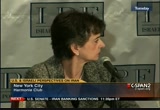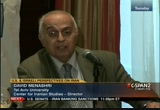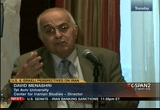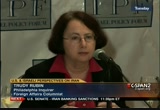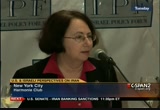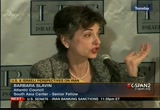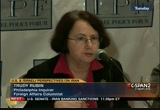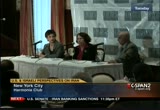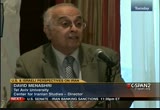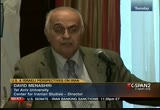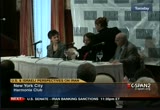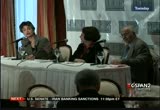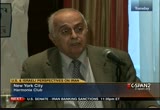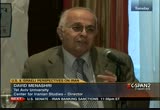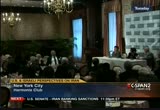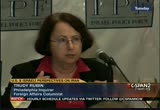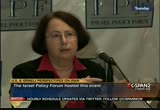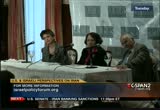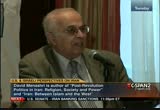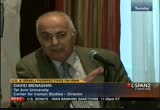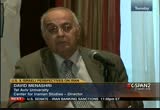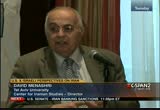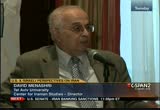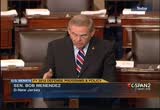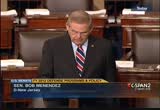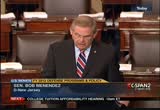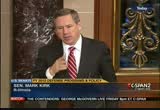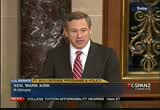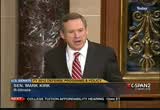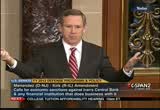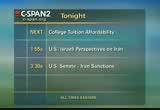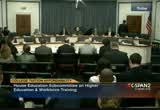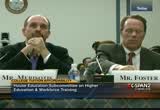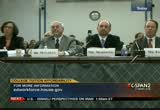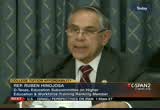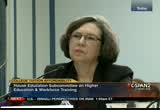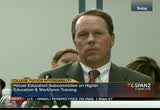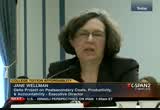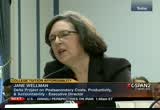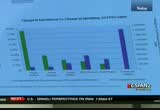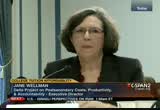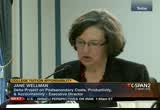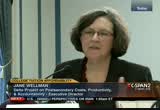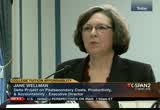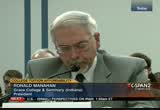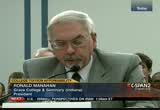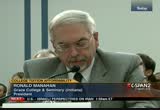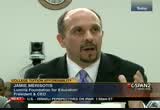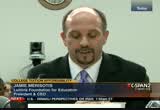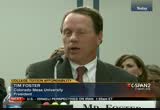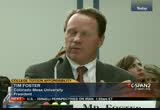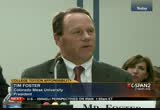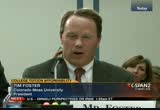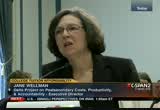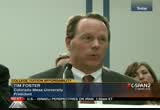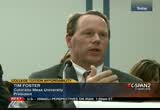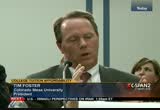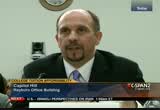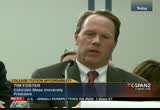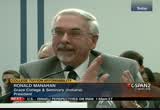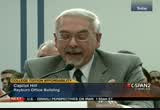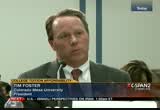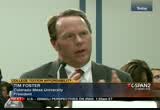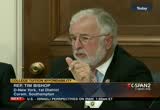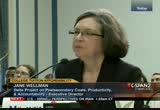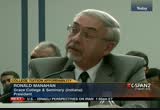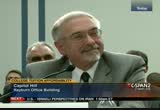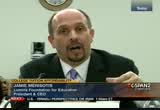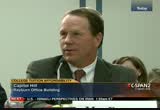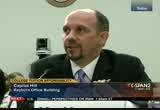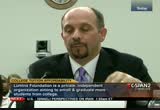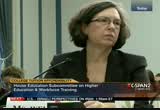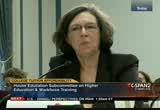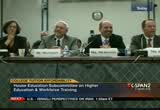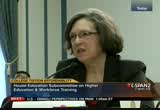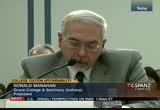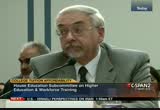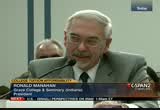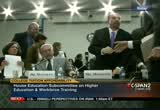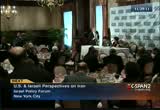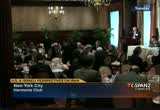tv Capital News Today CSPAN November 30, 2011 11:00pm-2:00am EST
11:00 pm
discuss the anti-government forces inside and outside iran. >> my efforts with mujahideen hasn't been much different. i think that if you want to have the hope of changing iran, you have to look at the children of the revolution, the young people of iran, educated, always on the internet. it is very developed. pressing iran as long as they allow them to be published are very good. there have been some times which is more than exists in other countries of the least. there are reforms and others and i was told by a friend of mine, the professor about the lack of freedom of speech. they tell you we don't have
11:01 pm
freedom of speech. that's not true, we have freedom of speech. we don't have freedom after speech. the problem all of these people ultimately. i think our expectations are beyond the capabilities of experts. no one knows when that was that starts. no one predicted the french revolution, the communist revolution, the islamic revolution, even the individual decision of anwar sadat to come to jerusalem and the collapse of the soviet union. the mass movement. they don't have this good habit of announcing ahead of time. one day we may wake up and there is not much we can do on this issue because the decision is moving from this kind of silent
11:02 pm
opposition to the mass movement. see what's happened in egypt and indonesia. don't have this expectation that people can't tell you this is going to happen. when it happens my friends and colleagues in academia say of course they knew. i know exactly what will happen. don't believe them because no one knows what will happen in the future when it comes to movement. >> i just had very briefly to that. there is no silver bullet. right now there are many in congress who think that the mujahideen itself is a silver bullet, and it is on our terrorism list because they killed americans back i believe it was in the 1970's. i can tell you from my trips to iran that they are disliked intensely by iranians because they fought with saddam hussein and the invasion of iran and the iran iraq warned.
11:03 pm
they are considered by the iranians to be traitors, and they -- their is a misguided impression among some in congress fuelled by the speakers' fees that is the magic answer. it is not and i think the risk where the to nisha examples are critical here you cannot make a revolution from below. we tried it in iraq and we failed miserably. it will have to come from within. we may be able to help with some communication equipment but not in an overt way or in a way that is going to make it happen as new gingrich has called for. it will happen when it happens. so this is not the solution to everything. >> does a valuable effective military option exist?
11:04 pm
>> yes i think that is the 64,000-dollar question, and i -- >> i don't think so because you can't bomb the knowledge of the head of the iranians. they know how to make a bonnet they want to make a bomb now and for sure you know there was a facility that was discovered inside of a mountain in the small enrichment facility. you know, centrifuges -- you can have a few small cascades here and here and they can be well hidden. if you destroy the known sites, they will start again, and with more justification they will say look what was done to us and we didn't even have a weapon. we are still members of the npt. we were still allowing the iaea to come in and you bombed us. so there would be the ticket for them to go for the bomb. they destroyed in 1981. saddam hussein redoubled his efforts to get the weapon and would have probably got in there is not for the golf war. what is the collateral damage? well, you destroy the reform in iran for another generation
11:05 pm
because people will rally around the government. inevitably they do when a country is attacked. people always talk about them being so irrational and wanting martyrdom. that's bull. they are perfectly happy to fight to the last arab suicide bomber. but they don't put their own lives on the line unless their country is attacked. so you know, we would rally them, destroy the reform movement and of course the price of oil would spike. the iranians would find ways to retaliate for their partners like hezbollah and hamas. i think that the israelis would have to attack lebanon first to take out his plus the 540,000 rockets so it is not just a matter of a few quick copps of saudi arabia and a few other places, that is why they want the united states to do it because they can't do it frankly. the u.s. does it, okay the remaining u.s. troops in iraq and afghanistan are sitting ducks. iran is already playing footsie
11:06 pm
with the taliban in afghanistan. that will become much more pronounced. they will perhaps attack the saudi oil field and the mistress. we have this plot against the saudi ambassador in the u.s.. well i had trouble getting my head around that one by sure they could find other ways to have the terrorist incidents occurred in the united states which is not something that they have done. suicide bombs in our city. so for what? to set back the program by a year or two and given a really good excuse to make a weapon? i just don't get it. i don't get the military option and somebody out there does, please come explain it to me. >> let me ask professor specifically, you saw this in israel a few weeks ago spurred by a column by one of the foremost is really columnists in the note in which he claimed the defense minister and the prime minister netanyahu were trying to convince the inner security
11:07 pm
cabinet to okay the attack in principal to do that didn't mean it was going to happen. subsequently, the defense minister said that the claims about the horrific repercussion to israel if they did launch an attack were exaggerated although he claimed no decision had been made. he said no more than 500 people would be killed if in retaliation if there were such an attack. i would like to ask professor menashri do you think israel was in a position to do it alone and secondly, what kind of response do you think iran would likely produce? i have heard senior u.s. military officials that iran could close the gulf, they've done all kinds of exercises not that they are keen on this happening but the claim the repercussions would be less than many have written so what is
11:08 pm
your estimation of how iran would react and what it is likely that israel would go alone. estimate it so difficult to predict what alone the future. my grandmother used to say it is very old and very sick and of the younger generation she used to say these days even the future is not what it used to be. [laughter] i was surprised so many times in my life with things we really didn't expect, and no one expected and they happen. so i cannot bear what is the outcome of the that the attacks and the military attacks was it successful or not? it should be different it is a successful surgical attack and a specific place, no casualties,
11:09 pm
but all something that leads to disaster supporting the heads of the iranians. i'm not expert on military means the center of the studies the year for her air force commander and one is the former commander of the intelligence. i can tell you that my understanding after the discussion is that it was highly unlikely that this kind of operation can be done with the capability of house and doesn't have, and it was not -- the
11:10 pm
commander of the air force participate on iraq. it is not easy. i think that it's too big of a mission for us want, and there are other powers stronger, superpowers than the israelis if you want to do it, someone else. we suffer from it. don't worry. if americans will do it they will attack israel. if israel will do it, they will claim that its america behind it. it is different. the difference is the key devotee and the power. if i have to sum up the difference and there is a significant is that about how much we should be concerned from
11:11 pm
an ongoing nuclear. i think i would disagree. you set yourself to a deep breath. i took a deep breath before answering this. the of the wisdom and the knowledge and they can do it. if this is the our theogene who is more brave than the others? they may get it, and it's not true that they don't have the military progress. and let's say that they don't. to move from the other isn't such a big deal. >> if they get it what are they going to do with it? first of all, say they have one or two. the big test, with all to north
11:12 pm
korea. they can't launch against anyone because what does it get them? how does it because a lot or hamas stronger to know that iran -- they know that iran is never going to use that on their behalf. they know that. they are anti-semitic. they hate arabs. [laughter] more than anyone, so they are not going to use it on behalf of hezbollah or hamas. what hezbollah and hamas have our rockets that can do a lot of damage and that is the way they operate. so what exactly does iran get accept it can be expressed and say we are a nuclear power and we are just as good as pakistan. what does it get them? >> to be like pakistan and india that's good enough. >> maybe they will be satisfied than.
11:13 pm
>> many ask how. i think there's a difference between the nuclear weapon and the democratic state in the hands of such a regime by think there's a big difference between them. i think israel is the only country that its neighbors threaten to destroy at clear cut from the day that it was born. i remember in 1973 when the defense minister of israel spoke about this might be the end of the temple and the destruction of the state of israel and everyone claims that israel has nuclear weapons. after the destruction there was a difference i would say between the two, and it is not just a question of.
11:14 pm
i think the position can be prevented. it's much better. >> i agree with you 100%. >> and stand with the chess board looks like from our side and what our leadership matrix is thinking through these issues. i don't have an understanding of the leadership matrix and iran is thinking about the issues and what they can actually achieve their goals through the negotiation they think the of the better alternatives to achieve for the for those goals are. still lacks the clarity to understand whether or not they would have the reason to the negotiation and what they would seek as that negotiation. >> they don't want the negotiations and why did they go around making proposals to halt enrichment at such and such little in return? that in place you have to sit down and talk to somebody about how such a transaction would be conducted. i think we need to test them more and i don't think the u.s.
11:15 pm
should just use the p-funk plus one suggestion. derwood device that grew out of another grouping. the french and the germans and started talking to the iranians back in 2003, to those of four when george bush would not allow a comprehensive talks with the iranians about the nuclear issue and other issues. so, you know, -- >> [inaudible] >> i think -- look, iran wants to be a recognized regional power. it wants to have influence in the region. it would like to have the nuclear fuel cycle because that is the sign of a mature power of one that has technological problems. has been used for the nationalistic purposes. the revolution has been a failure in so many ways but least they can say that they have this capability.
11:16 pm
it's something that mahmoud ahmadinejad gets to talk on the speeches on february 11th which is the anniversary of the revolution. i think it has a lot of meetings. there is probably a constituency in the scientific community that is sacrificed a great deal over the years including the loss of several of their members we presume the assassins over the years and they would like to see something at the end of it. the iranians, when i talked to them and they feel very much they've been handed a raw deal, why interviewed several times said how come you make a deal with india which developed nuclear weapons from a civilian program and now the united states, you know, has reached a deal sort of for blessing that nuclear program. the indians have come out from the cold and so one command line of iran, why has iran treated so badly because it hit aspects of the program for 20 years and still doesn't have a weapon?
11:17 pm
so i think we have to ask ourselves some questions coming and we have to try to see this through their eyes house well. and this is not to defend their activities at all. they operate through asymmetric means, through the groups that they've supported over the years. we've handed them enormous strategic advantages now in iraq and afghanistan by getting rid of the governments of those countries for them, and they are engaged in a kind of constitution with the saudis, now with the turks that were their friends that don't seem to be much anymore. they are worried about what is going to happen in syria. if we want to counter the iranian studs put effort into putting a good outcome in syria. it would be the biggest blow to the iranians strategically that i can think of. >> i just -- i think it's a very important question that he put forward, and i think that the answer is in constant motion because the region is changing dramatically. therefore the iranian calculations changed dramatically.
11:18 pm
i think there's no question that the most interesting feeler that the iranians put out was in 2003. when we had smashed iraq in a war that put us on their doorstep. and even that feeler when i talk to people in iran in 2003 who were involved in putting it forward, they said frankly that they didn't have the full approval of the supreme leader, khomeini. so now we your in a totally different situation which iran has to calculate where it stands. i agree very much with the point put forward by the professor menashri that the iranian regime right now is very much interested in its own survival, in the survival of the elite. and if this is seen as a vehicle to help ensure the future survival at a time when iran has
11:19 pm
to calculate syria may fall that strengthens the saudi policy, sunni access, and all these calculations are going on simultaneously, and even if the iranians are only moving towards a break up capacity that word will get out and that they may be thinking solidified regime and if you guess and i haven't gotten involved in this in the intensity that barbara has come about life is it would say this is not the time that they are interested in serious's feelers. they want to sort of decide the europeans from the americans. but even that may be passe. i think the garre waiting for the outcome of the air and spring and for the u.s. election. and right now, you know, this is not the moment.
11:20 pm
i wish it were. but that leaves us in the position of calculating the other question that's floating around which is what are the consequences of their getting a break up capacity? because we don't know that the ever really want to announce that they have a weapon or even support a warhead on a missile. but they want people to know that they can. and i think one of the most critical questions in terms of what is the danger is the issue of whether they are proliferators. somebody said they are like pakistan. to me pakistan is the most dangerous country in the world because pakistan has scores of weapons. they are building more and they are known proliferators. succumbing to know, forgive me for throwing out one more question before i come to this gentleman. but i am curious whether either of you think that iran might be a proofreader not in terms of getting an actual weapon, but say as many people have
11:21 pm
hypothesized material for a dirty bomb to hezbollah. >> i personally don't think so. i mean, you know, pakistan has actively proliferated north korea and sells anything that isn't nailed down because they need the hard currency. iran is not in those streets but this brings up the question of the super sanctions. if we continue to try to destroy the economy of iran and prevent it from exporting oil, then it might indeed provide the material for a dirty bomb. you have to sort of think ahead to, you know, whether we are not already involved in a kind of creeping military conflict with iran, and if so how they are going to respond. if they are really, really put to the wall. i don't see crippling sanctions is the way to go. >> sorry, did you want to -- [inaudible] >> i remember how devastating the sanctions in iraq were before we invaded, leading to
11:22 pm
the deaths of literally hundreds of thousands if not millions in the immigration of millions more. so i'd like to ask whether -- i mean, if you think a military strike might destroy or discourage the reform movement what impact will the sanctions that look as if it is becoming a main weapon of hours what impact will that have on the reform movement, and with respect to the elites in the opposition, what are the connections between any of them and other reform mass movement of the people in the streets or might consider being in the streets? >> i think the members of the grain movement all support the human-rights sanctions very strongly. they may understand the export
11:23 pm
controls on the material that could be used for the nuclear and missile program but by and large they don't support the broad economic sanctions, the sanctioning of all of these banks. iran is not a lot to do any transactions in dollars. it's difficult for them to the transactions in the year rose -- euros. they are getting paid in yerpis and softer yen juan. am i less bigger for the atlantic council talks about how they are resorting barbour for the oil of course very heavily dependent on china which is now the major trading partner. so, this is -- you know it is a problem for ordinary iranians. a lot factories coming out of business can't compete with the chinese goods or, you know, they can't get other materials they need. on the other hand, it hasn't had a sort of silver lining. the institute of the subsidy
11:24 pm
reform recently where they changed the system of having very, very low prices for things like gasoline and electricity. they raised prices and now they've substituted cash payments to about 80% of the iranians get $40 a month directly from the government. you asked where is the oil money, it is finally going on the table. it is the average iranian. and the government seems to be a able to provide district stipend to the people. there comes a time when the government can't do that then there is going to be mass suffering. will they blame the government? yes they will blame the government. they will also blame the outside world and say why are we being treated like this? what have we done to deserve this? >> yes. >> i have a question about whether [inaudible]
11:25 pm
11:26 pm
i would ask you to focus on the two key countries in the art of spring in addition syria and bahrain. and syria i agree that there would be the strategic change the matter any change in syria. if you ask why they are still there it is probably out of the field of what it would be when he's not. the question is a question of when, not if. then you have bahrain. it's changed the success would be devastating result with saudi arabia. unfortunately for iraq in the two countries they are standing on opposite sides. and syria they're putting the government against the people, so to speak. and in bahrain they're putting the people against the government. we, the people, the government. but i think it is not such a
11:27 pm
significant country but it is a symbol of [inaudible] -- on the nuclear issue, imagine if ghadafi had capability in the last few months. i think if the political earthquake convinced me even more in this kind of regime it is better that they wouldn't have this capability. or think about the earthquake in japan. there is no other nation that is thinking about the earthquake as a constant thing. at the university of washington the first thing they gave me is the key on how to east cape. whoever has been in japan those if this tragedy happened in japan it can happen in other places including in the areas of the facility's of other places
11:28 pm
opposed to earthquakes. i think the nuclear weapon in the iran is more dangerous to the people of iran than to the people of israel. one last point on the issue of the united states and i think that it will be much more close member. we look at iran and the united states it amazes me how much the to wonderful nations are moved by emotion rather than rational thinking. the two countries are not enemies, they cannot be enemies of each other. if they would ask themselves the question which is the country that is made of the greatest achievement in a strategy in the last 20 years it is the united states. america who went and broken to
11:29 pm
power of saddam hussein in 91 removed enemy number one and the taliban, removed saddam hussein in 2003, that was the cooler way to say america for its good services. but it shows that there are some -- at the end of the day, in afghanistan there are some common interests between iran. and i think that the 53 that was mentioned here before and the hostage crisis in 79 have made such that hasn't been recovered, and i think that for me even between israel and iran there is not much conflict of interest. there was no war but in iran and israel. no soldier was killed in a vise versa. ..
11:30 pm
>> we have time for one quick question more. >> given the economic situation in the united states united states currently and the continuing debt burden that shows no resolution, how do you feel that the administration, this one of the next one can manufacture, defend and support the american people for a possible preemptive strike on iran and if a republican president is returned in the election next year is that the
11:31 pm
consent of the american people giving that condition to a strike? >> washington. >> you know the polls, it depends on how the questions are phrased and by and large the majority of americans would like israel to do it and would not like the united states to be involved in such a war. the republicans, you know, they are all trying to be macho. it's not a pretty prospect. if you touch any of the military planners who have done the wargaming they don't like the outcome. they never liked the outcome so you know that his wife distress on sanctions and so on. barring some dramatic new event i would hope we could somehow get through this period without another military conflict. with dollar economic trouble and the fact that obama is trying to withdraw from that part of the world and focus on asia he tells us, you know i don't see it but i wish that the handling of it,
11:32 pm
the public relations of it were a little bit better and also the state department was more, was more involved in possible areas of talks. i don't think they really have exhausted that and i think for example american diplomats are now not allowed to talk to iranian diplomats without prior permission and that is what we had under the bush administration. you know, why? if they happen to be the same place at the same time they can't even talk to each other? i approach a lot of these things from the point of view from the old soviet union. we had détente. it in a busy there. we have exchanges and you know the situation finally got that are for russians. the soviet system collapsed. when you put all this pressure and you make everybody even more paranoid about regime change than they otherwise would be it is not conducive to the change of attitude there and it also makes it more difficult for us to act because you know we have spent so much time demonizing
11:33 pm
the others. >> i would just add one word. does that the sect very of defense panetta as secretary gates before him just came out very recently in questioning the wisdom of an attack, he said a strike would have serious impact on the region and he warned about unintended consequences. i think the administration is very reluctant. i know the europeans are also very very reluctant and so you know, if i were betting i would say under this administration, and my guess is that republicana republican president in 2012, i think they would come in and have to recognize the same constraints come even though the rhetoric is totally irresponsible and whiskey if it weren't so serious but i think that brings us full circle to the question that as you can see, there really is no answer
11:34 pm
here. i personally believe and i think the panelists agree, this is not the best time for dialogue even if it might be desirable, and sanctions you know, are struggling to craft a regime that actually would have a positive impact rather than either a negative or none at all. we didn't get into the issue of whether even stronger sanctions that might do more as britain just did and cutting off all banking transactions. i know there are things that would work and perhaps it would. so we are still struggling with a policy to try to get together to countries that shared a common interest but have not been able to find a way to meet minds and dealing with those interests and there is plenty of material for the next panel on what to do about iran, so thank
11:35 pm
you very much. [applause] [inaudible conversations] [inaudible conversations] the u.s. senate is considering a proposal for sanctions against iran's central bank in response to that country's ongoing nuclear program and charges of money-laundering. >> i come to thejectio floor tok to an amendment bipartisan amendment that my colleague from illinois and i, senator kirknd have offered.ha we believe it is one of the mose critical issuess facing our countryco in terms of national defense and global security. t and so we have come together to
11:36 pm
speak about it.t one of the greatest if not the t greatest threats to the security ofn our nation and our allies, and the state of israel is the concerted effort of the government of iran to acquire the technology and materials to create a m nuclear weapon. that will do two things. first, we can be sure that it will hold the balance of power in the middle east and second, altering the balance of power with a nuclear iran dedicated to the destruction of the state of israel would most certainly lead to hostilities. hostilities that could spill over to engulf the entire region and well beyond. mr. president we cannot, we musl not, and we will not let that happen. but the clock is ticking. published reports suggest that we may be just a year away froma
11:37 pm
an iran having a nuclear weapon. and the ability to deliver that nuclear weapon to --ri too, forestall the samaria and more importantly to prevent it from happening in the first place, we must use all of theoo tools ofls peaceful diplomacy available to us. w simply put, we must do everything in our power tobt prevent iran from obtaining acla nuclear weapon. i do not believe that there is e anyone on either side of the i/w whoit disagrees with that proposition. so, we come to the floor today tothat discuss a bipartisan amendment that i have offered with my friend from illinois,t senator kirk, to limit iran's ability to finance its nuclear ambitions by sanctioning the central bank of iran which has proven to be complicit in iran's nuclear efforts.mendnt this amendment, the
11:38 pm
menendez-recommend it will impose sanctions on thoseinst international financial institutionsit leading gauge and business activities with the central bank of iran. it is a timely event that o follows the administration's own decision last week designating iran as a jurisdiction of primary money laundering. in fact, the financial crimes enforcement network of of the department of the treasury wrote wrote, and i quote, the central bank of iran, which regulates iranian banks, has assisted designated iranian banks by bli transferring billions of dollars to these banks in 2011. in making these transfers, the central bank of iranra attempteb to evade sanctions by minimizing the directe involvement of large international banks with bothnin the central bank of iran and designated iranian banks.
11:39 pm
end date undersecretary of the treasury for terrorism and financial intelligence has qte written, and i quote, treasury is calling out the entire iranian banking sector including the central banktr of iran asero posing terrorist financing, proliferation financing and t monehey laundering norris to tht global financial system" maxim mr. president the administration's own decisions clearly show iran's conduct threatens the national security of the united states and his allies in the complicit action of the central bank of iran based on its facilitation of the activities of the government, his evasion of multilateral sanctions direcs to the government of iran, itsep engagement in deceptive elicit financial practices and illicit transactions and most importantly, his probation in support ofrees
11:40 pm
iran's efforts to acquire the knowledge materials and urani facilities to enrich uranium and to ultimately develop weapons of mass destruction threaten regional peace and globalwe security. we recently learned just how fad down the nuclear road iran has come. the international atomic energyy agency's report indicates what all of us already suspected, that iran continues to enrich uranium and is seeking to develop as many as 10 newment enrichmentam facilities, that in has conducted high explosives testing and detonator development to set off a nuclear charge as well asll computer modeling of a nuclear warhead. iran has engaged in transitory weapons test,lear that in august iaea inspection revealed that 43.5 pounds of a
11:41 pm
component used to armed nuclear warheads was unaccounted for ins iran and that iran is working on an indigenous design for a nuclear payload small enough to fit on iran's long-range shahab-3 missile, a missilele capable of reaching the state og israel. what more do we need to know before we take the next diplomatic step to address the s financial mechanism that isan's helping make iran's nuclear ambitions ait reality? these revelations combined with iran's provocative effort inhe october to assassinate the saudi ambassador to the united statesn demonstrate that iran's add aggression has taken a violent y turn and that we have every reason to believe that if iran gets a nuclear weapon, it may ut very well use it and use it against the state of israel. this amendment would imposeor
11:42 pm
sanctionsei on any foreign financial institution that engages in significant transactions with the centraln,w bank of iran with the exception of transactions in food, medicine and medical devices.ons it recognizes the administration's actionsns last3 week pursuant to section 311 of the patriot act designating the entire iranian banking sector an a primary money-laundering concern. requires the president to prohibit transactions of iranian financial institutions that touch u.s. financialionsnd institutions and to ensure thatl we don't the oil markets transactions with iran's central central bank of petroleum and generally and products with onle sanctioned if the president makes a determination that count petroleum producing countries otherri than iran can provide sufficient alternative resources for the countries purchasingthe from iran and if the countrycant
11:43 pm
declined to make significant decreases in its purchases of iranian oil.isan some mr. president this bipartin amendment has been carefully drafted to ensure the maximum impact on iran's financial infrastructure's and its ability to finance terrorist activities and to minimize the impact onirh the global economy.as history iran has a history of exploiting terrorism against coalition forces in iraq, in lebanon and even in their attempts to assassinate the saudi ambassador here inhe washington. while iran's drive to advance its nuclear weapons program hast been slowed by u.s. and international sanctions, it undeterred.yns today we take hopefully and i'le be there tomorrow when they vote on this amendment, the next chapter in isolating iranwork politically and financially. t i look forward to continuing to
11:44 pm
work with my cadolleagues on the other side and with the administration to achieve this t goal and to also advance legislation that i introduced earlierea this year with many others on both sides of the aisle, excuse me, the iran and north korea and syria and sanctions consolidation act which at this point has 80 bipartisan co-sponsors. our effortsts to date have been transformative but just as iran has been prepared to adjust tois loopholes, just as it has been prepared to take advantage of t every loophole to circumvent the sanctions and keep moving forward in its effort to achievr a robust nuclear program, we must be equally prepared to adjust and adapt by closing eacg loophole and stopping the nuclear efforts. by identifying the central bankn of iran as the iranian regime's partner in the financier of itss terroristt agenda, we can begino
11:45 pm
to starve the regime of the money it r needs to achieve its nuclear goals. i urge my colleagues to support this bipartisan amendment that willrv go a long way in closing financial loopholes, to help prevent the iranian regime for moving its nuclear ambitions to the weapons bays and closer to the warhead of a missile. we cannot, we must not come andw we will not allow iran to threaten the stability of the region and the peace and security of the world.reciat i appreciate my distinguished colleague from illinois who was on the floor who has worked with us in this regard, come to a common view and effort to maximize the effect on iran, minimize the effect on the global economy and certainly the passage of this amendment and i yield the floor to him.r: t 's been mr. president.mr. es >> the senator from illinois is recognized. >> i rise in support of the men mena desk recommended and i want to thank the mic partner inrt
11:46 pm
this, senator menendez, a member of the banking committee with me who has been a regarding iranian terror and iranian roller version of mass destruction and repression of human rightsri for 20 or 25 yeas now. and we are reaching now a decisive point in the relationse of iran to other countries and most importantly to the united states in this. i think this amendment comes ath one of the final hours of howhi. meansul and economic sanctions can be used to avoid a conflict and that is why it is so important for the senate to adopt the menendez kirk amendment with a long-term goal of collapsing the central bankpn of iran, so that this country does not produce nuclear weapons that would destabilize the entire middle east. now we launched this effort, ise senatorna menendez sendai, senar
11:47 pm
schumer, particularly w in augut when they called on our president to sanction the central bank of iran. in these partisan times in which the two sides are far apart on so many different issues we have 92 senators, all but eight senators sign the letter saying collapse the central bank of iran, use it as a tool in our d diplomaticlo war chest to make sure that we can remove one of the greatest dangers from theunf country,ro from one of the most dangerous, the regimes. the it is pretty clear. the international atomicne enere agency has ruled on the subject of iran. we remember the iaea because the iaea with regard to iraq and the saddam hussein weapons of mass destruction program was corct consistently correct and thetr bushat administration was wrong. the iaea said in its intelligence estimate that the threat was overstated in iraq, and so with that level of credibility, we should listen to
11:48 pm
the iaea on the subject of iran. and there they have been extremely clear as well. they have outlined how iran has a separate enrichment cycle going t way above the enrichment of uranium necessary to fuel a civilian reactor 5%. now towards 20% where there is no civilian use, moving towardsg the 98% needed to power nuclear weapons. they talk about undisclosed nuclear facilities, especially a brand-new one, which appears to be the final cascade necessary to enrich uranium to bomb grade material. date most ominously talk about a would equate what would be in aa nuclear weapon and unlike a conventional warhead which basically has a spark initiator and explosive material this warhead h has an electric generator aboard.
11:49 pm
it is only used to power andt' initiate a nuclear explosion, so it is clear from the statements of statement said the independent united nations agency that iran, a signature on the nuclear non-proliferation treaty is violating its obligations and is creating as fast as they can a nuclear weapons program. we know also that iran has become the first nation of the 21st century that unlike the kos north koreans who have failed in their space lunchtime aftertual time, was actually iran that was able to orbit the satellitee aboard the severe racket is the first nation to be able toon t accomplish that technological feat in this century and as we know, if you can orbit anywhere over the earth, you can de-orbit anywhere over the earth, an ominous sign for the future security of saudi arabia, of iraq, of our allies in turkey but especially our friends in
11:50 pm
israel and the united states. in the record of iran and this regime with regard to the righto of its own citizens shows thehe character of its government. we long ago, we knew about 330,000a baha'i citizens of iran who had been forced to register their k addresses, whose kids have all been kicked out of the n university, whoseot families art not allowed any contracting with the government of iran. the bureaucratic mechanisms of kristallnacht have formed. we have seen this movie in a different decade wearing different uniforms in a different country.ent at the ominous signs are it may turn out in the same way. many people in the international community know about this nathed who was protesting the stealing of an election in a ran andf heard that simply for protesting in that election. we knew about hussein menotti the first blogger who called for
11:51 pm
tolerance in iran who is now languishing in a prison. we know about a woman, mother of two whose sole crime was c representing a nobel laureate and how she was thrown in jail. beyond m the nuclear program,hua beyond the missile program,now beyond the repression of human rights in the country we know about iran's long recordec of terror, that iran is theah. paymaster for hezbollah.or a we have known that for a long t time. they have tortured the poor countrouy of lebanon, but in soe sense there was a symmetry. we understood how the shiite power would support a c. i'd -- shiite sect in lebanon but then over the last decade they jumpea the shiite-sunni divide and they also backed a new terror group s called hamas that was trying to surround our allies in israel
11:52 pm
with missiles and terror necessary to extinguish the jewish people and the jewish state. regim we know howe they're breedingis regime is also now one of the special pillars of the syrian s dictatorship and how is that dictatorship hangs on to power, on the back of iranian weapons and expertise allows them to repress their own people ande then most that on the backs of a s bipartisan certification that iran supports terror, president reagan, president bush, president clinton, president bush and president obama, we iro have seen a higher level of irresponsibility on behalf of the iranian regime. according to our own attorney general, the head of the iranian revolutionary guards cruise force suleiman, tried to contact d higher a mexican drugte cartel, one of the most
11:53 pm
s, dangerous, to assassinate the theeoarabian ambassador to united statesrg at a georgetown restaurant. and then it was only because tht incompetent iraniansen hire date dea agent in mexico that we found out about this.y been they would had they been able to compress their goal, lid off a car bomb in washington d.c. paid for by the government of iran al and reached all t the way to thn top level of their government. today we find that after they had their radical basij movement over run the embassy siege in eb classified documents and holding 50 british personnel, shades of the 1979 hostage crisis played 4 for 440 days iranian radicals held americans that our allies in the united kingdom have nowea made the decision to remove allm iranian diplomats from the united k kingdom.
11:54 pm
we have seen other calls, brave calls of allied action. a man i admire greatly, president sarkozy, has called i forni ceasing all purchases of iranian oil. he has publicly called for the collapse of the iranian central bank so it i ls with this level, irresponsibility, nuclearf technology, on the repression of human rights and the support of terror, on a plot to kill inside washington d.c. and the overbroadening of ann embassy of our closest ally inht europe, the united kingdom, that bipartisan menendez kirk amendment. what is this amendment do? did basically says in part, if you do business with the central bank of iran, it forces financial institutions and other businesses around the world to choose between the small andonom shrinking 300 billion-dollar economy of iran and thef
11:55 pm
14 trillion-dollar economy of t the united states. in that context we all know how. just and we wish that choice to beo made. we seek to break the stable financial intermediary inut between iranian oil contracts and the. outside world so that t will just be easier to buy it oil from elsewhere and working with our allies to make that oiw more plentiful.mendme now we realize. the concerns wis this amendment.ly, t some have said that this amendment comes too quickly ande too soon and so that is where senator menendez and i have agreed and in working with the penetration to give time and flexibility.s rig under this amendment nothing happens right away. several weeks and several months go by before any action is required and that is intended as a signal to oil markets that this requirement is coming, that we seek for you and our allies or example in japan or south
11:56 pm
korea or in turkey to wind up your current contracts and oth supplies, to meet your needs by other means than and by other means are coming.ucti to we are expecting libyan production to double. we are also expecting iraqi production to go way up and ofsd course we know the swinglove production of saudi arabia, noan love lost towards the iranians t after trying to kill their ambassador here and working with the oil suppliers to make sure that everyone's needs are met while funding to the iranian regime is slowly choked off. we alswoo provide two waivers ir this amendment and this is veryr important at the request of the administration.te r we say thaesttr if there is a temporary restriction of oil supply, that this amendment can be suspended for a time and if there is some unforeseen national security disaster, soms real problems also he has that flexibility. but the general picture is this. the central bank o of iran is te
11:57 pm
heart and financial soul of a web of terror, of nuclear production, human rights abuse and other peoples visibly ins syria.ia there is no longer acceptable to the international community andr so this regime should operate without the benefit of funding from the international community. i think this amendment is one of the last best hopes for peace to bring a fact did, economic sanctions to bear so that a burden does notsa fall on ourael friends in saudi arabia or allies in israel to do the far more tougher military work thats may be required to remove this y common danger. many people say that you can't convince a country who is on a nuclear weapons course tol, reverse course and i say well you show your ignorance ofrgenne history because we saw the a argentines give up their nuclear
11:58 pm
program, the brazilians, likely the south africans detonated a weapon and then decided to give up theirhe program. and kazakhstan, in ukraine nuclear weapons were given up. i in libya nuclear weapons were given up and withsu effective pressure i hope is that it can happen here. we know that presidentd ahmadinejad is not popular. we know the regime in general does not enjoy the support of its younger citizens. we know that at least half of te iranians in a stolen election gw voted for the other guy who was not allowedho to take power. and so this amendment comes forward the solid bipartisan agreement. it has been endorsed specifically by senators lieberman, schumer, kyl, feinstein, gillibrand, manchin, stabenow and heller. for us it gives time for the oil markets to adjust.
11:59 pm
it gives flexibility to the administration but most importantly, it helps us deal ia an economic and diplomatic way with one of theone greatest das to our society. the we think about the future ahead and some people say this amendment could cause someye disruption in the oil markets and yes, we are asking countries to unhook from the terror regime in iran, but just think about the instability that would calm his military conflict broke outa between iran and israel orns worse, if nuclear weapons were loose from iran in the middle east. if we do d nothing, as soon as o years from now, we could have an detonation of an iranian nuclear weapon in the middle east. if weho show weakness and a lack ofof resolve, and countries in that region will decide they need nuclear weapons programs of their own, we will give words to the saudi's of the weapons
12:00 am
program and the egyptian nuclear weapons program and others.s an this amendment is an attempt to make sure that s the 21st dang century is not the mosting dangerous century ever facing young americans and to use the full economic weight of the united states working with our allies to remove what is the greatest emerging danger i thini senator menendez is living in te the spirit of those who watched the 1930s and worried about when america slept.p. we are not asleep. we know exactly what ishe happening and by decisivee' bipartisanre action of the sena, we are bringing the best pressure to bear of nonmilitary means to make sure that our kidt inherit a much safer 21st century and without i commend mo partner in this effort and urged the senate to adopt the menendez kirk amendment and i yield back. >> a few moments a hearing on
12:01 am
12:02 am
>> now a hearing on college tuition affordability. the chairman of the house subcommittee on higher education, representative virginia foxx says parents and students should be informed shoppers when choosing a college or university. this is about two hours. [inaudible conversations] >> good morning everyone. this is a fairly small room and we are all going to be very friendly today, because we are in tight quarters, but it might get a little warm in here.
12:03 am
but, i want to welcome everybody to this hearing. a quorum being present the subcommittee will come to order. i would like to thank the witnesses for joining us today. we appreciate the opportunity to hear your thoughts on the growing cost of higher education in america. over the past decade, the cost of attending college has increased dramatically. according to the college poll, and in-state tuition and fees at public four-year colleges and universities have increased approximately 72% since 2001, and at my home state of north carolina the sticker price for a four-year public college has jumped 25% in the past two years alone. this troubling trend of higher prices has several causes including weak local economies, increase spending on student services and academic support and state budget crises. states facing deficits of
12:04 am
persistently high unemployment have been forced to cut spending across the board requesters all public colleges and universities can no longer rely upon the same level of state financial support and must make tough decisions to help make ends meet including cutting services or raising student fees. leaders in washington have long recognized the value of higher education in preparing students to compete in the global workforce. in 1965 congress created the higher education act to help low income students pursue a college degree. as a result last year more than $169 billion in federal financial aid was disbursed to undergraduate and graduate students, up 81% since 2005. however as i mentioned struggles with the trillion dollar budget deficit and unprecedented national debt continue to increase federal subsidies to supplement the growing cost of college is simply unsustainable. in the last school year, the federal government provided roughly three-quarters of all
12:05 am
student age. despite this tremendous taxpayer investment, billions of students are still struggling with significant student loan debt burden. clearly the rising cost of higher education in the united states is a problem but the answer cannot be found in loan forgiveness gimmicks or federal takeover of the student loan industry. as we continue to rethink their role in education, we should use our influence to encourage accountability and transparency. our end goal should be for the states post-secondary institutions and students to determine the best path forward. higher education fisherman fundamentally unchanged since its inception with most universities and colleges were flying on professors lecturing to a classroom of 18 to 22-year-old students who live on or near by the campus adding significantly to their cost of attending college. to help reduce tuition and fees, institutions of higher education should be looking for innovative ways to incorporate new technology and better address
12:06 am
student needs. under the current system there is little incentive for schools to enact lasting changes are accountability measures for the billions of taxpayer dollars spent each year. states, students and parents must demand accountability for the investment, not defending -- depending solely on the federal government. in fact in fact in some instances the federal government has done more harm than good. for example, we have seen this of administration restricted to make freedom and tamp down on innovation through an appropriate regulatory policies. prospective students and their parents with mass make it part to educate themselves about the true cost of attending college. meanwhile, colleges and universities must do their part to streamline costs and lessen the burden for students whenever possible. fortunately some innovative institutions have already taken this upon themselves to do just that. many colleges and universities
12:07 am
have dramatically reduced administrative costs by eliminating or consolidating duplicative services. others have found ways to make use of empty classroom space, offering courses late at night and i'm begins to help working students pursue a degree. university of washington and some campuses and universities in wisconsin system recently implemented accelerated degree programs. these programs help institutions save on operating costs and pricey student services while also allowing students to reduce their debt load by graduating in a shorter period map of time. is a higher education recently noted cabrini college in pennsylvania is working to cut tuition of fees and more than 12% without lowering merit scholarships for incoming freshman. indiana's grace college in colorado mazie university are also working to reduce costs and we look forward to learning more about their initiative during today's hearing. each of these initiatives helps ensure more affordable college
12:08 am
education remains available for students across america. is to continue to share best practices like these while also encouraging increased transparency in the reporting of annual college costs. by making the most up-to-date information on tuition and fees available to the public, students and their families can better understand the cost and a long commitment they will make and develop a plan for managing any results of death before stepping foot on campus. i look forward to a productive discussion with my colleagues and our witnesses on how we can work together to help keep college attendance within reach for students nationwide. i would now like to recognize the ranking member ruben hinojosa for his remarks. >> thank you chairman -- chairwoman foxx. would like to welcome our distinguished witnesses today. this hearing is an opportunity for this committee to reaffirm its commitment to affordability,
quote
12:09 am
12:10 am
12:11 am
most states are slashing their education budgets. in the past several years, democrats have taken historic steps to make a quality higher education more extensible and affordable for greater numbers of students. the passage of the student aid and fiscal responsibility act known as safra enacted as part of the health care and education reconciliation -- reconciliation reconciliation -- reconciliation act since the g.i. bill. in the 111th congress, democrats ended the taxpayer subsidized federally guaranteed federal family education loan program known as felp and replaced it with the william d. ford federal direct loan, making federal college loans more stable and efficient at no cost to taxpayers. by transitioning to the direct
12:12 am
loan program, congress was able to reinvest $68 billion in federal student aid. staffer increase the maximum pell grant award, enhance the capacity of minority serving institutions and community colleges and strengthen the income-based repayment and increased investments to other federal programs. the bipartisan past higher education and opportunity act of 2008 increased transparency and investments in federal student aid. under heoa, the u.s. department of education is required to collect and publish lists of tuition and fees at all u.s. to post-secondary institutions, holding colleges accountable for rising fees and tuition. those institutions were the largest percentage increases in crisis must submit a detailed
12:13 am
description to the department of education outlining the recent for the increased cost. heoa encourages the use of innovative strategies to reduce costs such as meat-based grand aid in incentives. while democrats have made great strides in tackling this issue through the federal investments and pell grants indirect loans, the american opportunity tax credit and the heoa and safra i agree with education secretary arne duncan that we must continue to do more to reign in college costs and reduce individual student debt. i look forward to hearing from today's witnesses on how we can expand affordability, accessibility and student success in higher education and
12:14 am
return nations college completion goals. thank you. >> thank you so much manner -- mr. hinojosa. also can the members will be permitted to submit written statements to be included in the permanent hearing record and without objection the hearing record will remain open for 14 days to allow statements questions for the record and other extraneous material referenced during the hearing to be submitted in the official hearing record. it is now my pleasure to introduce our distinguished panel of witnesses. jane wellman is the creator and director of the delta project, a research and policy organization that works to improve productivity in higher education through more effective management of resources. since 1995, she has also been a
12:15 am
senior associate with the institute for higher education policy. dr. ronald manahan is the -- having served as president since 1994. dr. manahan services schools professor of the vocal studies by president of college academic and probe goes. mr. jamie merisotis, merisotis, got it. [laughter] is the president and ceo of the lumina foundation for education. before joining the lumina foundation in january of 2008, he was the founding president of the institute for higher education policy. mr. tim foster was appointed as the tenth president of colorado mazie university in march of 2004. mr. foster previously served as the executive director for the colorado commission on higher
12:16 am
education and head of the colorado department of higher education. before i recognize you to provide your testimony that may briefly explain our lighting system. you will have five minutes to present your testimony. when you begin to light in front of you will turn green. when one minute is left, the light will turn yellow and when your time has expired, the light will turn red at which point i ask that asked that you wrap up your remarks as best as you are able. after you have testified, members will each have five minutes to ask questions of the panel. i now recognize ms. wellman for five minutes. >> thank you very much. good morning madam chairwoman and members it's a pleasure to be here. speaking about the research done by the delta project as a nonprofit, nonpartisan research group focusing on brenda money comes from and where the money goes in higher education. i'm going to speak quickly about
12:17 am
what we see is some of the major patterns or major trends on the revenue and spending data for higher education. are dated cover public and private nonprofit institutions. i will be focusing on the time period roughly 1999 to 2009, revenue data. there is a bit of a time gap involved, but so you can mentally adjust for some of the numbers i'm going to be talking about for the last couple of years since 2000 then we know that there have been continued dislocations particularly in public institutions. the first comment, first pattern, this will be more zen than usual so you have little tiny versions of these in your testimony so bear with me and i will get through them quickly. the first pattern has to do with the levels of economic stratification and the real differences between public and
12:18 am
private -- here we go. between public and nonprofit private institutions over this period. one of the really big stories over the last decade has been the growing bifurcation between public and private institutions, with the majority of new enrollments, 1.6 million new enrollments going into public community college is an awful lot of increase spending occurring primarily in a relatively small handful of elite institutions with endowments. you can see on this chart, the way we have organized all of the status are five ride sector carnegie categories. on the left we have private research universities and on the right community college is. the green line here is what has happened in increase spending per student on average in that sector since 2009. the purple line is where the enrollments have gone, so you can see the sort of here what the differences have been.
12:19 am
if you will go to the next slide, one of the consequences of this as you will see is a real unevenness in access to resources between the relatively small handful of elite institutions in the majority of institutions where students are aren't orrin rolled with average spending per student in the elite institution somewhere around $35,000 per student versus public community college is where spending is closer to $10,000 per student, so it's a real pattern of differences and other than this one generalizations about finance in higher education are always a suspect in such differences. the second major comment has to do what has been happening to tuition which i know is the primary interest of this panel. you know the story of rising tuition, which has been continuing to rise well above inflation for the last 20 years. however, there has been a growing difference between
12:20 am
growing prices charged to students in spending per student or cost per student said the growing price and cost gap is one of the other big patterns we see in higher education. for the majority of institutions increase tuition revenues are not translating into greater spending. the reason for this cost-shifting as other revenue sources are evaporating in the institution rather than reducing their spending and some might argue they can't reduce spending that much. but rather than reducing spending, they are shifting the costs onto student tuition so costs are here, tuitions are here and what you see in a geared bike 2009, time of recession, what you see is both cost-cutting by the institution and price increases and having those two things happened simultaneously is one of the real unsustainable patterns in higher education. if you look at some of the data
12:21 am
here, this figure here shows just a one-year change between 2008 and 2009 and what has happened in tuition revenues, how much institutions are capturing in revenues per student versus what they are getting in public institutions from state and local resources versus what they are spending on the students are looking at that gap between revenues, spending, tuition and state revenues and spending gives you a pretty good snapshot of what is going on, just to read one of them off. and public research universities, tuition revenues average increase in one-year, $369. at the same time that the institutions of losing on every $751 per student from state and local appropriations. despite that they get spending about flat, very modest increase in 92 bucks probably because they were spending down reserves during that period. the look of the next chart you will see a 10 year pattern in
12:22 am
the same kinds of numbers and what you see is that over that 10 year period most of the new spending and higher education is coming in from tuition revenue. the same kind of pattern of price and cost to disconnect over that period. the third comment, don't have charge on this one to let me just speak to it. it has to do with where the money is going in higher education. one of the patterns we have seen and it has been commented on widely in higher education has been a modest erosion but a consistent erosion in the amount of money that is going to pay for the direct cost of student instruction and the spending that is going for administrative activities, academic support which could be computing and for other types of functions. so you have seen this winding down, very modest but consistent in all types of institutions from the elite i.v. to the
12:23 am
community college's. reduction in spending for instruction and an increase in spending for administration. what we saw in 2009 was an interesting and we hope will come slight change in that. the first year of the great recession when you see evidence of spending cuts to an institution. this time we saw greater attention -- i'm sorry, i'm read already. to the efforts to control administrative expenses and make the cuts they are versus what is going on in spending on instructions so protecting instructional spending. i'm going to jump quickly to ono one other major point and then i will stop and that is if you look for a smoking gun in higher education about where the spending has been going up, the single biggest factor for increase spending his employee benefits and specifically health care, up 2%, 5% per year consistently over time. if there's there is one area where spending has to get caught up it's going to be health care. my apologies for rushing through that.
12:24 am
>> five minutes goes by in a hurry. >> i didn't even see it. my apologies. i beg your pardon? >> madam chair? i ask unanimous consent that we all agree to extending the time of five minutes to a minimum of seven, possibly eight so that we can really go over these numbers that have been extremely of great concern to many of the members on both sides of the aisle and i think that it's worth giving them that additional time if you have no problem with that. >> thank you mr. hinojosa. let's see how our panelists can do within the timeframe and ms. wellman has set a pattern here. we will try to be fair to everyone involved, but we won't set the time is seven minutes. we will leave it at five and try our best to let people finish
12:25 am
the thoughts and we will be fairly lenient if questions. house that? >> i have no problem with that. >> thank you. dr. manahan. >> thank you distinguished committee members for the opportunity to testify this morning. my name is ron manahan, president of grace college and seminary and an accredited residential christian institution of arts and sciences in indiana. grace offers undergraduate and graduate programs and enrolls over 1600 students from 36 states in eight countries. thank you for the opportunity to testify and provide you with information regarding our institutions efforts to address the rising cost of college education. for a number of years, we have been concerned about this issue. the economic turbulence in 2008 and beyond made even clearer that our campus had to address rising costs with greater
12:26 am
urgency and that federal and state support of higher education is challenged. week did not simply stand by and wait for help. grace has received the most attention because of its three-year degree option but we reviewed many aspects of our college and we have more to do to determine where savings and reforms can be made, specifically we address rising costs in four ways. in 2007, our strategic plan called for the evaluation of every academic program in terms of data points such as enrollment patterns, staffing, cost-effectiveness, demand among high school students, job market issues etc.. each program was placed in one of our four categories listed in my prepared testimony. the review was completed in
12:27 am
2009. this led to program adjustments in some cases and the teachout elimination of six programs. grace help students either finish as grazer transfer to another institution offering the students program choice. several programs were added and focus more directly on areas of student program interests and regional needs. a second way grace addressed costs was by reviewing institutional operations. for more than eight years, grace has taken steps to reduce operational costs by seeking more efficient ways to serve students and employees. after thorough review, the campus or teacher glee of blind physical plant operations, food service, publications, marketing and printing with regional businesses that provide good service. we have been able to contain or
12:28 am
reduce costs. a third way grace addressed costs is by exploring innovation we developed a three-year degree option for every baccalaureate degree program grace offers. this innovation required an intense two-year development and preparation process and added five goals among which are requiring 120 credit hours for all baccalaureate degrees and achieving increased accountability. though the option began just this semester, very very early results are positive. 48% of freshmen students indicate they plan to graduate in three years. freshmen are averaging a semester credit hour load of nearly 17 credit hours.
12:29 am
applications and deposits for next year are up substantially, partly i think because of this new option. the three-year degree option reduces costs 25% compared to the four-year option. a second innovation addressing cost is grazes weber school, two-year degree program designed to make education affordable and more at risk areas among individuals with much to lose in this economy. ft. wayne in indianapolis are our first two locations. we are looking seriously at other great lakes cities. this program matches the first two years of our on-campus four-year degree option. the annual cost for a full-time student in this program is only $7800 before any aid is applied.
12:30 am
a third innovation is grace's placement promise. students meeting certain criteria may be eligible to earn an additional year of undergraduate education tuition free. if they don't find employment or gain graduate school acceptance within six months of graduation. the fourth way grace addressed costs was through collaborations and partnerships. for example, grace collaborated with two, four-year institutions to offer nursing and engineering and designed and offered the nation's only graduate program in orthopedic regulatory and clinical affairs in order to meet a regional and critical business need. ..
12:31 am
for your interest in this topic. >> thank you, doctor. >> good morning. chairwoman, ranking member, thank you very much for this opportunity to be here. i am president of the lumina foundation, the nation's largest private foundation focused exclusively on post secondary education access and success. streamlining costs and reducing to vision and higher education isn't just a good idea, it is essential to our future. equity of education
12:32 am
opportunities and american values that gets a free person the chance to succeed and contribute. but the most important reason for student cost reducing tuition and the modern economy is simple. it's jobs. recent estimates show by 2018 more than 60% of american jobs will require some form of post secondary education. today only about 40% of american adults have in assessing its or bachelor's degree. the animals between 25 to 34 this level was only good enough for the u.s. to rank 15th among the developed countries. by comparison a stunning 63% of young adults in south korea have a college degree. lumina believe 60% of americans will need a high quality degree or credentialed by 2025 for the u.s. to remain economically competitive. much, if not most, of this increase will need to come from low-income, first-generation minority and adult populations. unfortunately we don't have the resources to scale up hour current system to the size it needs to be in order to be able
12:33 am
to produce the numbers of graduates our economy needs while maintaining or improving the quality of its graduates. the best way to increase the number of highly qualified college graduates to the level that we need is for the higher education systems to become more productive. to meet the goal of raising college payment rates to let least 60%, connectivity and performance will require a substantial increase in the number of high-quality degrees and certificates produced at a lower cost for the degree awarded while improving access and equity for the least well served populations. to this end, lumina is working with states and institutions throughout the u.s. to redesign higher education to produce more graduates at the work costs. working with our partners to confront the core assumption of how higher education as structured, funded and delivered. the work on productivity and higher education is based on four specific strategies. the first is performance funding
12:34 am
for targeting incentives for colleges and universities to increase college completion for underserved populations. to shorten the time to the degree of provincial and reduce the cost of delivery. many states are moving to performance funding models that base some portion of institutional support on the number of graduates produced rather than just the number of students enrolled. tennessee is not disturbing 70% of its higher education appropriations based on results and quality rather than just a moment this concept is spread rapidly with nearly 20 states already using or developing performance funding systems. the second strategy is using student incentive to increase course degree completions. a good example was found right in my home state of indiana at indiana university kokomo where students connect to 30 credit hours per year maintaining continuous settlement and making satisfactory academic progress received three successive years of discounted tuition producing
12:35 am
a savings equal to one full year of tuition by the end of the program. the third strategy is to develop and implement a new model of delivery for a simple a consortium led by the university of texas at austin is working with carnegie mellon to the opening initiative to redesign general the education courses which can be completed faster in some cases twice as fast than traditional courses with the same or better student performance knowledge retention over time. the strategy for increasing productivity and higher education is to introduce business efficiency to produce savings that can be used to graduate more students. much of what needs to happen here is to encourage cooperation collaboration among institutions to improve the quality and cost. since ohio began borrowing and will efficiency savings, their public colleges report more than $900 million in reduced cost. now my written testimony i discussed some of the implications of state and
12:36 am
institutional efforts to increase productivity related to the critical issues of the federal financial aid, data systems and quality assurance. for now let me say federal student aid continues to be the bedrock of support for low-income populations and must be sustained. but innovation and creativity will be required to serve the increasing number of college graduates that our nation needs. in addition it is urgent we develop comparable data at the national level on student progression towards degrees. college graduation and ultimately job placement. in terms of quality assurance me to realize we are on the cusp of a fundamental change in higher education a shift away from its system based on time to one that is based on learning. in the knowledge based economy, the degrees and other credentials must represent real skills and knowledge not the amount of time a student spent working in the classroom. the post secondary degrees and credentials as vital to our
12:37 am
economic future. these dramatic improvements cannot happen unless we streamline costs and reduce tuition making the higher education system more productive. at least you have heard it is working on this issue on many fronts and we stand ready to share any and all of what we are learning with all of you. thank you very much. >> thank you very much, mr. foster. >> thank you midranking chair and members of the committee. it is a pleasure to be in front of you and it is an honor having not been in front of a congressional committee. we're supposed to be in denver talking about this very topic but decided to come here to testify in front of your committee. our state -- [laughter] based on the plane flight i think it was a bad choice. our state is home to one of the most efficient according to the delta project systems the higher
12:38 am
in the country. we are second as you measure the baccalaureate degree is based on the dollars invested. we also rank among the top five or ten depending on the year the percentage of the population with a bachelor's degree or higher. with that said we face the same stress and strain is the institutions and other states face. we take a 30 present reduction support over the last two years it proposes an additional 10% and quite frankly we expect that might increase to 25%. this is not news to anyone. we've been watching it primarily on medicaid which is dreading those kind of cost shifts in the state budget and so we've been preparing for this for the better part of seven years. counter intuitively what we have done is on the revenue side with the pricing lot of charges for every credit hour that they take. surprisingly enough what we saw when the students paid for each credit hour the credit our activity actually wind up rather than down. and we think there's speed to
12:39 am
degree will accelerate. we also have done a lot of different things in terms of financial aid. and so, we do a merit financial aid system where if you were at 375 for love and have one of the effort to top 5% in the credit rating class or 29 hct we give you a full tuition scholarship. we found 59% of students who have the need also qualify for the merit scholarships. and so, what we also found is because we have higher expectations in terms of academic performance, the retention of the students is high year and we think the courage to ration rates are going to increase as well. for middle-income students to get left out of the financial late conversation, we look at the work study and work study i think has been one of those things sort of ignored the federal and state level because students who are engaged in a work study also retain higher levels and so we offer up to 20 hours of work study money regardless of the need and again
12:40 am
see a significant increase in the retention, and it's really the connection to the institution and connection to the people love the institution which we think is the critical element in that game. on the expenditure side and with some and trepidation with chairman fox, wearily on the side and looked at our structure , president, vice president of academic affairs, the dean, chair, faculty, students, and we spent about a million dollars six years ago. we made the decision on our campus to do away with the beans. we don't save a million dollars we save conservatively estimate about half a million dollars and while our faculty have missed that voice and administration i don't think the students have missed the expenditure of funds whatsoever. we also because of those ongoing budget reductions it is a sort of continuous budget cutting exercise and i say budget cutting and i will tell you been talking with folks in the region they pushed me a little bit and say budget cuts are efficiencies and i have to concede most of
12:41 am
them are efficiencies. and so, we have done a number of things in addition to the beans with getting the copier systems, having the largest renewable energy program where we use ground source heat exchange to heat and cool buildings about 75% of the cost of heating and cooling buildings. we get suggestions like in the summer we now concentrate all of the class is in one or two buildings and so we don't cool and maintain and claim the other buildings. i could go on and on but i would be way over my five minutes and get in trouble with a fisherman. i will tell you according to the state agency there are over 500 accredited institutions of higher learning in the state of colorado. like adam smith anticipated a perfectly competitive market place i would submit to you we see it in higher education and that is true in most states. if we are not doing a good job, our students tellus and if we are our parents tell us. i have an open office our every
12:42 am
monday, i need every two weeks to cover student government and i go to every door of every semester and we have pizza and talk about their experience is, and we try to listen to what our students tell us in terms of what we are doing. recently, we've been fortunate i you talk about the percentage increase. our percentage increase was 4.7% on tuition and fees. regrettable, but again there is this claim which is affordability and quality, and i would submit to you that if we slash quality, that i don't care how affordable the visit is not worth experiencing and it isn't worth spending time and money on. and the reverse. if it's high quality and you can't afford it and obviously it is meaningless. i will tell you a little nervously we do spend a lot of time and energy trying to comply with and understand the direction from the u.s. department of the education. for example, we operate a satellite campus in colorado and have for about 20 years.
12:43 am
that community asked us to bring our assistant program and because of the recent rules with the department of education, we have to actually submit a formal change request which is about authority page document and will take us until untold hours of time to try to get that approved so we can try to meet the needs of that community. we also spend the financial aid office an inordinate amount of time poring through policies and directives because the goal post move every year. last but not least, sort of my apologies this is the requirement in terms of what information we have to put where on our website. it has to be one or two clicks away. this cost us hundreds of hours of staff time, and again, i guarantee you with 500 choices, students if they can't find the information that is contained here conveniently whether it is expense, safety, quality of programs, again, they let us know and they know what by going somewhere else. so why would -- i've gone over a little bit and so with my
12:44 am
apology, madam chair, i will wrap up right there and say thank you for having us. we think this is a critical issue and the future of the country is based upon our continuing efforts and educating both young people as well as adults. >> thank you very much, mr. foster. again, thanks to all of you. i think you did a commendable job of transmitting a lot of information in the short period of time that you were given, and i appreciate the effort that you made. i will begin now with our questioning from the members to you all come and most of us made some comments before we go ahead and do the questions, and i did want to say that i appreciate --
12:45 am
i read your written comments last night and these will be in the record, and i want to say to anyone who's interested in getting a fuller perspective on the things you said that i would commend the materials that you submitted. and i will make two or three brief comments, and then i will ask a couple questions. number one, mr. foster, i really appreciated your saying -- you didn't mention this in your comments -- that cmu understands to our customers are, students. someone who works in institutions of higher education, i think too often there is a failure on campuses to recognize that. ms. wellman, at some point i think we should talk a little bit more about the area of benefit and how that is driving cost because i'm not sure that we have had a full enough
12:46 am
discussion of that, and as somebody who has worked in the system a long time i'd like to see us talk a little bit more about what we've known about innovative programs for a long, long time coming and how they are working. it seems to me we've known a lot of these things. we've known about student learning files and we've learned about dual credit and things like that that i think perhaps don't get enough attention in the public arena and are not presented as alternatives to increasing spending. there are ways that we could reduce cost. and mr. merisotis, i could not let this meeting go by without commenting on the really impressive comments that you made about a system based on learning and on time and to the
12:47 am
code. i'm very impressed with that approach that the lumina foundation is taking, and obviously we need to do more of that in higher education. i wonder if, ms. wellman, if he would -- if you have any other examples that you would like to give about how institutions are dealing with state spending shortfalls. very very quickly, do you have any of the examples you would like to present? >> the general pattern as i mentioned historically has been for public institutions to off load a lot of the reductions in state spending on the student tuition. i think in this recession institutions figure that they have had the wall on that, and we have seen much more evidence now of big public systems as well as smaller institutions paying a lot of cost-cutting activity. they are paying attention to
12:48 am
student credit accumulation. they are going into the purchasing cooperative. they are tackling health care. i think there's a lot of good examples, more now than we've ever seen before. >> mr. foster, would you mention something more about what kind of scaling back you mentioned scaling back administrative and operational costs. tell me a little bit more about how you address some of those. i'm intrigued about, for example, the summertime using only a couple buildings and cooling them. that seems to me to be something that more and more schools could do the same thing in the wintertime. would you mention something about that and how did you address the concerns that were expressed on your campus? >> when i first got to campus we were actually operating slightly in the red, is one of the first things -- and up we did the
12:49 am
traditional approach would convene the committee and an even numbered kennedy wasn't very season that time and they came back 3 trillion that we would talk on whether we eliminate all the others said if money is an issue then we would have to join those to walk away from the deans. we also engaged the cameras as a whole. the classroom idea in the summertime we had a suggestion spot on our website and we get suggestions all the time. we have rebid of insurance. we were able to pull out of the state's insurance pool and we are effectively underwriting the department of corrections and of transportation which are obviously much riskier than teaching on a college campus and so we are able to save money there. from the student perspective, i should go back and say because we chat a little bit earlier one of the things our students have the ability to do and i think it was an experience you had when your president was the jewel in a low-income students who were in high school could take the college credits while in high school and in colorado the
12:50 am
school district actually pays for those courses, and so we have students who increasingly start with 20 come 30, 40, as much as a full year under their belt and so it just gets them a running start and really maybe they are not completing in three years but it somehow feels like they are paying for much less. >> one more quick question. the program that you mentioned then you want to take to another place. is that program already approved by all of the approval systems on your campus and you are having to do the regulatory process all over again just because you are moving it to another place; is that what we understood? >> yes, ma'am. what's ironic about it, in colorado -- one of these federal agency state statutes regulations -- we are designated as a regional provider for the western part of the staid but the size of west virginia. and so, what we are supposed to
12:51 am
do is to the rules or programs which are all completely approved and, as you described, it is just a matter for that community would like us to take that program within our region 50 miles down the road and for somebody -- i think it has to do with the debate you'll have about proprietary schools and those sorts of things here fairly recently and so have been trying to ratchet up and tightened controls on the college's ability to offer programs. it just makes absolutely no sense to me whatsoever. we will write authority page report and go through the process. >> today is not regulatory reform but it's an issue we are very concerned about. mr. hinojosa? >> thank you. i have found your presentation, each one of you, very interesting, and i certainly hope that we can take it and a tough you're sharing of success stories. my first question is to jamie
12:52 am
from the lumina foundation. the federal government continued ensuring access to low-income and traditionally underserved populations. it's important throughout the country. briefly tell us how do you square the national goal of increasing the number of college graduates with controlling costs? >> thank you very much. there is no issue more important than increasing high-quality degree of talent for the nation's least served populations, low-income first generation minorities and the important population of adults as well. we need to think the issues of productivity and not see it as something that is actually being done by paid somebody to somebody and in fact represents an opportunity to increase the capacity of the system to serve more students and so we can expect parents and their students to bear the increasing cost of higher education without there being very high consequences for us as a
12:53 am
country, and what we've done in the last decade or so is essentially shifted more and more of the burden to them as a productivity represents the best path forward in terms of increasing the capacity to get the students into and through college as quickly as possible and help them become productive members of the workforce and the society. estimate will you elaborate on how the federal government can work with the states and institutions to better collect and disseminate clear and concise information on the costs you talked about? >> i think it's been to be extremely important that we of comparable data based on progression on completion and job placement. there are lots of cases where the data systems simply don't allow us to make effective decisions about how well students are doing and whether or not the system of higher education is serving our goal as a country. moving from that time based that learning based system of higher education that i mentioned where the student is the unit of analysis and not institutions i
12:54 am
think we have an opportunity to better serve the students using these federal data systems as well as the state institutional data systems and collaboration to help us better understand where the challenges are and how to serve the students better. >> thank you. tim foster, in your written statement you use the phrase artery financial calculations. what do you mean by marjorie financial calculations, and are you referring to the calculations used to determine student eligibility for the federal title for program or is this something else? >> we would be referring to the grants as well as student loans and how those changes and how much attention we have to pay our financial aid staff have to pay because the rules change every year in terms of if you are in this major you make this much and at some point i served in the state legislature and i will never forget the district
12:55 am
attorney we were debating and he said you have to have some confidence in the district attorney's judgment, and i would submit to you we would be much more effective if we had a little more confidence and financial aid officers of devotees to package and have flexibility in terms of students they want to give that to and feel are making progress. trust me they are not out there trying to give aid to students that are not progressing and they just are inconsistencies in terms of what my major is and if i feel this and it is not my nature okay then i'm still a little bit if i feel this in the semi major and i am not eligible and it is just the sort of one-size-fits-all parameter and that just really gets in the way of all sorts of crazy gyrations and machinations to try and maintain those students in college. >> mr. foster, 500,000 eliminated of the been positions. will you point specifically to
12:56 am
where the savings was invested in the students attending? >> what we've been able to do it again the chairwoman will appreciate this. on the college campus you really can't start new programs because the programs are like small businesses to bid they all lose money as you can imagine if we started the program the bachelor's degree of nursing or the construction management mechanical engineering program all we have started none of them would be fully enrolled or carry themselves and so, that half a million dollars in savings allowed us to have an actual revenue over expenditure so that we could start this kind of programs, and it's those kind of programs and i guess i go back to the old naacp which the to college, get a better job. if you don't have those degree programs coming and we've added the better part of about 20 all of which have double digit the employment opportunities over the next decade and its first-generation students in particular who find compelling as dewaal. if i go into this major what am i going to do it afterwards and
12:57 am
so those revenues enables to start those variety one-year, two-year, four year degree programs which create wonderful opportunities and for us our strength as a community as a two year or four year graduate institution you can come in in one year have your certificate be a nursing aide and be working and pursue your bachelor's of nursing, continue working and come back now and get your doctorate of practice so those sort of things are what we think are going to help people and keep them committed. why do i need a college education? it is that the employment opportunity. >> thank you. my time is expired but i hope all of my colleagues will address the three year degree program because that really caught my attention. i yield back. >> excellent. ronald manahan, i liked your discussion of your dialogue on the three-year program saying it
12:58 am
ends up offering 25% savings to the full-time students paying tuition, room and board. tell us a little bit about the years you'll carried this out and why more colleges are not using your model. >> thank you for the question. our understanding is that we were in some sense beholden to more than the calendar on the academic year and we ask the question is there another way to conceptualize the academic calendar, and we did. the basic of the program is simply this. each semester is divided into the 28 week's sessions with a weekend break between them, and that is repeated both in the fall semester and the spring semester.
12:59 am
when students enroll in the three-year degree option, they take 33 our courses in the first eight weeks. so the focus is narrowed down to 3e as opposed to five, and it comes at them more quickly if you will. they repeat that again in the weeks so at the end of the first year they've completed 36 hours. >> it's the equivalent of taking the semester under the regular program that we know that's correct. >> what we've learned that that is this having taught for a lot of years in a more traditional format monday and wednesday and friday and so on there is a lot of stop and go traffic that happens. you teach and then there is a long weekend and you come back
1:00 am
and are looking up to the previous time and moving forward. this produces some of that and we have learned from students once they adjust to the piece of it, they are intrigued with and they seem to prefer narrowing the focus to three as opposed to fight scattered over a long were period of time. >> that's an interesting response to my question and i will close by saying is it possible those taking that program that did a good worker some number of hours per week would say ten, 15 or 20 hours, is that possible? >> i think it is. if they chose to. another element of that degree of sinn is that we require of all students 12 hours of applied learning, that is they must participate in a actual real world situation to test the
1:01 am
value of what they are getting in the classroom and how they are progressing, and we do that to advance their employability and there are some other elements to that. >> thank you madam share. >> thank you mr. hinojosa. ms. bigger. >> thank you for holding this hearing. i think this is a really very timely and very important and think you told the witnesses for being here. i come in thinking about this, and in the revenue that come, the one thing that wasn't mentioned, and i know that colleges really try to keep their alumni involved by participating in the fund-raising that the universities and colleges to maybe mr. foster if you could speak to that we've seen a reduction in the appropriations from the state and federal.
1:02 am
is there -- has there been a decrease in giving by alumni or others to the university's? >> well, madame chairwoman, as you identify, those reductions in state support that we can try to make the visit particular alumni coming and i would say that while the dollar amount has declined the number of gifts have decreased so we have a blog pool although they are giving less intensely and so it helps. it's not the entire solution. it's not like any problem you have you try to find as many possible contributors to solve that problem and that is certainly one of them. >> thank you. ms. wellman, there is fault to be the view that in higher education institutions like to keep up with the joneses and the
1:03 am
other universities. i took a tour of one of the universities in my state of illinois and was great. the one thing that i noticed was the huge building that was just being built, and it was beautiful, huge. i asked what it was and they said that's the fitness center. now this is very important to me in illinois is the only state that has he every day for keefer 12th. so, this is very important, but in this time, and i asked why are they building this and they said because we need to have that to get the students to come to the university. how can we make sure that the colleges provide necessary for kids? is this something that's done to keep up with other universities competition?
1:04 am
>> it's a good question and i don't have a great answer. many institutions face a double-edged sword in this environment. it's a very competitive environment. they are looking more and more to students as a consumer. they need to get the students that have the money to pay and the students that have the money to pay one to have those facilities and so they say the need to have it in order to compete in the market they are in. i think the competition for amenities rather than academics putting money into the academic program is a great concern to a number of educators. so spending going and athletics more than on academics it is going up in dorms, it's not going up and student support. i think it is the nature of the consumer reality though that those kinds of immediate palpable benefits are ones that students seem to want to have and so i think it is a tension that is easily resolved. >> i co-chair the house financial laconic literacy
1:05 am
caucus with mr. khanna shows the degree to -- hinijosa it's critical that information like this be available to students and their parents. mr. foster, given your close interaction with students, how much of the responsibility should fall on students to be informed consumers and are they when they are coming to the school and is there more that students and parents can do as consumers to help increase the competition among institutions of higher education so the school fits their financial needs? >> i will say a lot of responsibility falls on our shoulders in terms of making sure that information is available and we really look at a good match for the student is critical for us and not having them finish of the colorado
1:06 am
universities kind of a personal affront to us and i would tell you increasingly going back to 9/11 i think you saw a change in parents and students and non-traditional behavior in terms of their inquiry and pursuit of information relative to if i come if my son or daughter finishes as the total cost of attendance and we emphasize trouble cost of attendance because they want to whittle it down and assure themselves they will be able to afford it and we try to say don't do that. you've got to be prepared for this cost and they are less than a lot of the institutions that we talked about, but it is a two-way street i guess would be my answer to you and i think it is a place agencies can play a big role when i was at the department of higher education with transition away from the regulatory role to being more
1:07 am
and from people in colorado had a listing of cost expenses graduation rates retention rates and then you could evaluate for yourself which school you want to go to. >> thank you. i yield back. >> mr. bishop to the estimates before madame chair and thank you very much for having this hearing. it's a very important topic and i think the witnesses provided us with a very helpful testimony, very enlightening testimony mr. foster, i want to search you made reference to shifting the eligibility for federal assistance based on the students' academic major. i'm not aware of any eligibility standard the federal government maintained that differs for any of the programs based on the student's major. am i missing something or --
1:08 am
>> let me give you additional information. i'm just a president so we are obviously the least informed but as we talk about in preparation of this hearing we talked about the fact in fact i take the toys to the saddest tv to a satisfactory progress from taking biology for example and i feel that course and that puts in doubt my understanding my eligibility if i'm not i feel that course. >> i'm going to respectfully disagree with the advice that he's gotten. the eligibility for the financial aid to the federal level to the best that i know and i administered the students for a number of years before i came here. if it is written exclusively on information provided on the facts which is subject to so-called uniform methodology which sticks out a bottomline called the expected family contribution which by the way is not perfect but it is a think
1:09 am
the best system we have so if you were not something -- >> thank you for your testimony. i just want to be you found the principal driver of increased student to visiones cost shifting that is to say reduce the state appropriations for publicly supported colleges and for all colleges reduced philanthropy, reduced income and so on. is that correct? >> in the public sector in particular cost shifting is a little bit more of it in increased spending jogging tuition among some private but all. >> increased spending driving tuition is that more localized in what we might refer to as the elite -- stupak actually not it is the institutions that don't have the endowment.
1:10 am
>> talk about increasing quality but maintaining a portability. islamic that's exactly right. >> one of the things that we hear frequently is that -- and there is a very forceful proponent of the notion i am about to suggest, and richard hu we hear frequently tell us that the reason the costs are increasing is that federal student aid is increasing and because federal student aid is increasing, that gives, which administrators the license to raise costs beyond what they normally was. does your data give you any evidence that is true? thank you. doctor manahan, i am minister dismal college that was particularly good at being not for profit. [laughter] i wanted to commend you for your efforts i think they're very good and very innovative but i wanted to quickly -- the little
1:11 am
over $10 million of institutional aid that you administer what proportion of revenue does that represent? in other words what is your discount rate? >> it is about 40 to 41%. >> so if you will come in your sales or 100% and the net sales are roughly 60% is the right? does that represent discounted tuition or income from endowment and philanthropy? >> it is almost entirely from tuition. >> do you have any sense of where that place is you among the comparable ones to titian's? when i left new york state the average discount rate was somewhere in the low 30's that was nine years ago. do you have any sense of where that puts you? >> yes i do there are a few discount rates over 50%. we certainly are not there.
1:12 am
depending on the dominant levels if you think of comparable predominance two hours you might find some in the upper 30's, but we have work to religiously to move that to this level and find an operational have to succeed. >> is the 10 million principally need base or a combination of need and merit? >> it's a combination of need and merit but given the nature of the students we serve and similes they come, the mayor it is theirs. estimate it would have been justified by the need any way? >> thank you very much madame chair. >> thank you. doctor? >> thank you for your testimony today. the cost is personal 12 levels
1:13 am
one being 23 and a half years since a grudge with medical school paying what i call my second mortgage on my student loans and the fact that my daughter is a recent graduate from that is about and and interest by mr. merisotis's comment saying on your kind of training to success after spending 21 years in the military if there's one thing we are experts at it is the time and not the standard we are the experts at craming 30 minutes of information into two hours. of all the areas we took a the driving cost, two questions. do you believe anybody that there is an increased cost due to the duplicity among programs in states and systems of higher education we went through a period they decided to offer for your degrees and the state college decided to get into advanced degrees and the competition that causes would be the academy research universities and second, the
1:14 am
increased cost deutsch to the need perhaps to provide coursework who are not quite up to standards deutsch to the fracturing of the cave creek golf and secondary approach as opposed to the p16. >> the question on duplication with the economic crisis we face there have been a lot of choices institutions have had to make and one way i think you can see that being promoted is through the models as i mentioned in my testimony where you differentiate by mission you have a better chance of being clear when you expect them the institutional mission and therefore you can create incentives so you don't have overlapping and things like that, the time period of cost cutting and i think we've gotten close to the end of that because there's not a lot left to cut to
1:15 am
differentiate the mission is a very important outcome and potentially positive outcome of the unfortunately challenging economic time -- >> remedial education is clearly across driver. it's not a smoking gun kind of cross driver it is a fairly low cost education. the big problem of remediation it isn't working very well. the proportion of students who get into it are successfully ray mediative to go on to some sort of like a maximum access suite of a conundrum of making it cost-effective but making it work better. that is a big problem. spry getting it is a student cost driver, so it's amazing what percentage deutsch students come prepared early reading and
1:16 am
math and the chairwoman and vice pluggable lagat and that is the one you have. some districts taking money in colorado partner with some of our area high schools and we identified those in need to develop education at the general level when they take bct into on their campus we send instructors a mover in the district pace in the graduate ready but it really more is individual cost the just >> thank you madam chair and thank you for the hearing. mr. merisotis? device the right? >> it's fine. >> no, evan wolfe -- i have a
1:17 am
lot of vowels to the performance funding is a very good and valid point. thank you for that. let me ask you a little bit about what the phenomena but the reality of the income disparity that is happening in this country and the major tool to close the gap is education. in particular post secondary education. and so, as we look at making sure that that educational equity part of the discussion is applied to the next generation, with me talk about the program, and can we discuss how increased investments in those programs and similar programs across the country might help mitigate first increased tuition cost by helping students degree and the preparation that also has to happen is to make absolutely. you're point is that equity is absolutely right which is a copy of educational opportunity is extremely important.
1:18 am
that has to include both improving access to higher education and ensuring those low-income first-generation minority and other students have an opportunity to succeed and that is a lot of what is going on in the performance based funding models is efforts to ensure they are successful. in indiana flexible to performance based model takes into account the success of low-income students in the population. the programs have been one of the most important efforts of the federal level the increased opportunities for first generation and other students for decades and i think they are extremely important in terms of the future. we have to recognize students don't just pay for college they actually have to be prepared for collagen to succeed academically, financially and socially and that academic financial and social support comes from the programs because they help students that understand the system, work their way through the system, getting all the way through college, so it's a very important part of the overall
1:19 am
federal landscape. >> if i may, you mentioned the regulation issue mr. bishop asked you to and i agree the regulations should be streamlined for schools but i think there's also very and pretend to help us understand rising costs to prevent accidental or intentional misuse of the taxpayer funds and you mentioned you spent hundreds of hours of additional cost in preparing the school's information that the student expects to have and they have to have before they make their decision doesn't that information making -- the
1:20 am
information the of the generate for the government also available in the same sense? >> it is important to read all of the information that cannot and was required to be one or two clicks away was contained in different places we thought were more intuitive and we spent a lot of time like dr. manahan singing what do you look for in this information, would you want from us and when you make a decision. ischemic you say they are on comparable. >> we had where we thought students would go and then what we had to do is reconfigure to make sure the students that need one or two -- >> if i may let's talk about reconfiguration. one of the things i think there's a great accomplishment in the last congress was creating the income based repayment program so that students would be able to manage their debt. can you speak to efforts that
1:21 am
your colleagues have undertaken to inform students about that program and have the means for them to be able to manage that debt. is that part of the information they receive? >> apart from that information is a different data and information what you are talking about. we look and monitor the average student loan debt and it is an issue we try to track very closely so we've done this out of the person in the financial aid office who will they do is get counseling because in student loans unlike in the banking situation nobody sits down and says this is how much you can afford to pay back based on your occupation so we try to create that person who sits with the students and says here's how much you can afford to borrow as a graduate and one to pay it back in a reasonable amount of time. >> the elephant in the room, the debt and the loan side, 40% of the debt students have is for profit colleges which represent
1:22 am
less than 30% of the student enrollment. anyone, d.c. that as a factor affecting the cost and of the regulatory intent to try to find out what that is and who is responsible for that. anybody? i'm out of time. that was my best question, too d'aspin if i might very quickly, the data we have on spending, revenue and spending weekend include for profit because of the problems in the comparable data. it's something the fed has to deal with and we ought to step up to. i can't answer your question because the data isn't there. >> thank you very much. dr. rowe. >> thank you and think the panel for being here. i think our higher education system in america is the best in
1:23 am
the world. i think there are two issues that we face in this country right now and that is rising health care costs and rising education costs probably neither one of us sitting appear the diocese has not benefited from a great college education and basically public education. i went to school for 24 years and dr. manahan went in three. i wouldn't recommend it in my worst enemy but that is what we did then. one of the concerns i had is i lived at home when i went to college, had a job, my father worked in the factory. we have no student loans then. i was able to work, live at home, go to college and finished with no debt. number two, because medical school was affordable of that time i dreaded it from medical school with no debt. i was able to move from east tennessee in a palatial and underserved area because i didn't have hundreds of thousands of dollars in debt and
1:24 am
take less salary and serve that area. i see young people now that i get letters all the time i'm sure everyone of us do with hundreds of thousands of dollars of debt. how has that happened where a young man like myself frankly it was very simple when i went to medical school. i saw what the tuition was up one private university not too far from where i lived it was more than my father made in a year and the university of tennessee of memphis which wasn't and i made my decision to go there, both great schools. a lot of people do that. that isn't hard information to get and i think the lord three children of men are graduated from college and they are out on their own. but how has that happened to us because we cannot sustain this current seven, eight, 10%. kids like myself will never be able to go to college or as the doctor said spent 25 years of your life basically paying for a house which is what it costs to
1:25 am
go now to 2000 at a private university when i went to school probably the state of tennessee covered 80 or 90%. today it is under 50% in the state of tennessee at a public institution and it is all being shifted to the students read any comments? >> i may have a walking advertisement for financial aid i have a pell grant come federal student loans policy assistance. i got support from the institution i went to work, i did all those things. there was 30 years ago. the problem for today's students multiplied greatly because the rising cost of higher education and to your point i think the changes that students and families are at their limit in terms of the capacity to be able to deal with these issues. part of the challenge comes back to the point in my remarks which is that we can afford to reduce the capacity of the system to produce graduates. it is very important the
1:26 am
economic future as a country that we increase the number of highly qualified graduates in the country. that means we have to make the system much more productive particularly for those who haven't had the opportunity, who haven't had the prior success from their families etc., and i think that is an important issue to understand from the state policy perspective, the institutional policy perspective and federal policy perspective there are many things that need to be done to enhance productivity. >> if i was foundation board president of my colleagues before i came here and i'm still on the foundation board of the public schools both and we've raised money on the private side and shook everybody down that we could come in and i know mr. foster probably has done the same thing as president of his college and dr. manahan also but there are limits to all of that, and i don't know what is this? >> the good thing about this recession has been we finally i think our starting to hit the ball for many years and the
1:27 am
public sector states institutions were both complicity in allowing this to happen. nobody decided to make it happen. heaven because other things. budget went down, to push into the institutions have long believed that more money always was necessary for more quality coming and i think that we are turning the corner. i don't think we've turned a corner. >> let me go over a couple things that ms. merisotis said. we have the pell grants, the hope scholarship which is where we use a lottery money. and still young people graduate. what we've done is we've gone to the community college and when i was in school and went to community you didn't transfer date for your college you have to repeat the course again. we stop that. you could go to the northeast state college and transfer that to the university of tennessee. we now are requiring colleges to look at graduation rates, not at the number of students in there to get their funding. i think it is an extremely positive step you mentioned just a moment ago there is a higher
1:28 am
education center in tennessee that has five colleges and it. the city built it, the bricks and mortar and hit university of tennessee, king college, northeast community college all have classism there, so they don't have this incredible investment of bricks and mortar as ms. biggert mentioned. and in trying to attract students you can go from a freshman degree to a ph.d. and never leave kingsport tennessee and go to two different schools during the transfer of the credit i think that is extremely important and there are many other things come on line class's which are less bricks and mortar than we are doing and we have to do these things or as i said, folks like myself will never have a chance or number two will never be out of debt. >> thank you. mr. tierney? >> thank you madam chair. i was wondering if the doctor could get some help he seems to have loose cash hanging around. [laughter]
1:29 am
i want to thank the witnesses. it has been helpful on this it is an issue that destroy was always and the reauthorization forever on the basis of an effort we've been traveling by the fact that the federal government, the state, the families, the paltry to get more people than to colleges. and that moves on. the states have moved to reopen a long period of times we put up for reauthorization of the efforts of the provision to read we've read tremendous feedback from the colleges and a lot of the four year colleges as well that if we hadn't done that the tuition cost would go up even more. it would have been more difficult. should we enhance that program? are you feeling it isn't necessary because schools are now trying to deal with stuff on their own? >> i don't have a good answer. i think the problem of the state budget is so much bigger than what is happening in higher education that the pressure on
1:30 am
states to cut funding are going to be with us for the next several years. whether the federal maintenance of effort of requirements put some brakes on that i think they probably do. this is not the time what they could be strengthened or rewritten i don't know. i don't think the thing causing the states from bring is related to what's happening in the state budget. >> thank you. spec for a lot of law schools, the institutions on that. senator grassley and i started on the path last time and many of those schools to even take 5% of their income back into education related efforts on that. they still maintain the tax-exempt status. is that an area we ought to be expecting more we ought to be expecting schools with billions of dollars of endowment to pay at least the minimum amount other charities have to to maintain the taxes on the status
1:31 am
1:32 am
so now the school might not be in favor of a benefit to that person but the individual does so they get paid less and benefits or they shipped it somehow onto a system on that basis. that is in seem to be the wisest way to proceed. is there another alternative here? mr. foster? >> u.s. the hardest question so i'm glad it got the first to cut. would tell you that i think there's a temptation to do what you talked about and i think some schools have gone down that road and a think most of those that haven't turned around and gone back the other direction because it comes down to quality and quality of people and they think we all are scrambling
1:33 am
tragic bind other places to contain costs. i was not in because it is technology. it's a cost driver because this generation of students just demands way more robe is technology then you and i even consider feasible so it really has been searching ever possible to try to reduce those costs and costs and see if we can simplify what we do and it is extraneous to the core mission of what we do. so reteach for courses per semester which is double that of most institutions. there are just those sorts of metrics that at some point, you are ready to be a college president sounds like to me so we will switch places. >> it sounds attractive sundays around here. [laughter] and lastly, on the transparency issue that you talked about mr. foster, i think that you are probably unusual if you have had all of the transparency provisions that the higher
1:34 am
education opportunity act asked for and i commend you if you do. the idea of having institutions with the largest percentage of increases in tuition prices amid an explanation for that. did you have that before the actor is that something added on? >> we didn't hit those percentages so we didn't have to deal with that. >> used innovative strategies to reign in price increases in use those incentives to keep costs low? did you share that information with others? >> i do with ugly e-mail to all the parents of our students and try to do two things, one communicate the issues and secondly as i tell them the more engaged they are in their students education and if you are like me ask your son what happened today and i get no answer. if i have a little bit of information i get a lot more back so we try to give them this is what is going on on campus so they can engage with their student and retell the midterms are coming in you might want to inquire if in fact they are studying for midterms and so those sorts of things help that dynamic. >> just quickly if i can.
1:35 am
what kind of feedback have you had with your institutions on line with a price calculator? >> you know i guess the feedback i've gotten, i go out and help students and so this year was the first is that i had probably a half dozen parents say we were considering this institution generally a private and a couple of instances of public and we looked at your programs and your price and we chose here because you are this much less. so it was the first time i had someone just out of the blue say that was a consideration and that's why we are here. i assumed they were doing that using our price calculator as well as the other institutions they were comparing us to. >> thank you. >> thank you mr. tierney. mr. thompson. >> thanks to the panelists for i think it very important topic in terms of access to affordable education. we spent a lot of time in committee talking about the burdens of federal regulations, reporting requirements on all
1:36 am
forms of education. this question is specifically for dr. manahan and mr. foster. your experience with your universities, you know, to give a sense about how much time you spend on april regulatory reporting compliance and do you have some suggestions for us about how regulations reporting could be eliminated without jeopardizing integrity of the financial, federal financial aid system? >> i would be happy to. that is a good question. we have calculated on our campus, and we are a small campus, we spent about $460,000 a year on salary and benefits to address regulatory issues, and then that's not counting the other things we need to provide them, so what that equals for us
1:37 am
is we spend about 300 plus dollars a year per student to care for regulatory matters. we certainly believe they there aren't number of regulations that are very helpful and protective, but those that have less value perhaps and fewer changes to continue adapting to bad as a way to reduce some of that cost as that adds onto the on to the cost of the institution. but, i would grant you that there are regulations that are very helpful as well to the students as a consumer and other such things. but, overreaching regulations may be challenging to funding.
1:38 am
but. >> i tried to give you some sense a couple of areas. we have a quantified and i'm glad we have because i would be lamenting how much we are spending on regulatory compliance. i would say though the federal collection of data we use intensely to compare ourselves to other institutions and so we have tried things that the delta project is out or we will find that information ourselves because you never know how well you are performing without getting into the context i would say the collection area something that is actually very beneficial i think for all this because you use common definitions and everybody knows exactly what that is. it is below that radar screen in terms of increasing and i appreciate the difficulties with proprietary schools and whatever issues you are dealing with but it is pulling us into that vortex. this is really starting to spend hours and we can get you more discreet suggestions in terms of
1:39 am
areas. if nothing else if we stop changing the definition of the federal financial aid, that would be great because then we could know and we could tell students from year-to-year exact what those criteria are. >> i just wanted to quickly come into the brand-new report from the federal guys rate that looks at 15 major areas of higher education act regulations and ways in which durden and overlap and other things can be reduced and i think that may be helpful in terms of decision-making of the committee. >> what role does the integration of on line learning virtual campus have in increasing access and frankly potentially decreasing costs? >> huge. like i said we represent or cover an area that is very more jackrabbits and people in large portions of western colorado so from an axis perspective for them to be able to take classes on line, it also equally as a
1:40 am
matter of convenience for our students. i think the overwhelming majority on most campuses on line activity or students or exley taking classes physically on campus and they use it to balance their schedule and time management whether they are working or doing other things and then there is the obvious avoidance -- is more intense. the theory was you can scale it in half hundreds of students in a classroom and the experiences are not that way but it certainly avoids bricks and mortar mortar so it is extending the life of our classroom building so we can grow beyond -- we anticipate 20% of our credit hours will be delivered on line because of of those worshiping so there's a 20% bump in terms of how many classrooms we will need because of that on line activity. >> i mentioned carnegie mellon open learning initiative which is developing half the time and another great example is the western governors university which is on line competency based learning model which is delivering programs and only four key areas, teacher education, business i.t., and
1:41 am
nursing and they're having high success rates with her competency-based model but using on line delivery and we think there is a lot of potential for those competency-based models using technology to proliferate. >> we would agree with that. we in fact in this three-year degree option, the three years allows the two summers in between to be taken on line by courses provided for our campus, from our campus and those are tuition free to the students. it allows the student to go perhaps returning to their home or summer employment, whatever you need to do. if they need to fulfill some degree component traveling to another country, it still allows that and we have other uses of on line as well in our graduate programs. >> thank you madam chairwoman. >> thank you mr. thomas. >> thank you very and chair. thank you to you all for being
1:42 am
here. i want to change the scale here for a second and talk about california if i may. and i'm not expecting your experts necessarily in that system but in terms of what you know and to applied as you probably know as well. the governor's 2011/12 budget is below 98 funding levels with 75,000 fewer students than the 2037 students that are enrolled today. so clearly a different scale than we are talking about. and of course, thousands of people have been laid off etc. so i am wondering, you know at what.does the streamlining and the savings hinder student learning? how far can a large system like that really afford to go, to afford graduates and both an opportunity to graduate but to graduate with something substantive to contribute?
1:43 am
>> california, i worked there for many years and including in the legislature on the ways & means committee. i know more about it than i know what to do with. it's a tough, it's a tough one. there'll are ready, they're cutting axis and probably cutting quality. you can't cost manager way out of the problem california has got. having said that california has weakened his policy capacity in the last decade, so that they no longer have what they once had, which was a way to look at integrated comprehensive solutions so they are all on their own lately. i think there's got to be a return to policy capacity in that state to once again look comprehensively across this institution. as bad as it is -- as bad as it is california still has a lot of money in higher education but it's not being invested very well. >> revenues as we know are coming from students at this point. finally i tell a group of my
1:44 am
district in san diego i do recall writing checks brady $9 a semester to berkeley. i don't want to tell you when that was but it sent a different message to me certainly that the state.i was actually pretty -- because they were making an investment i don't think students feel that way today. i wonder if you could talk just for a second about the transparency issue because i understand what you are saying bad people figure out how they want to make comparisons. they know if they have some assistance, some scholarship money, whether it's cheaper to go to one school then another and still get quality. but are there other things that you think families and students really should know? i heard a statistic this morning, 85% of regulating seniors this year will be living at home. that's pretty striking. what is it that you think it's fair for people to know as they
1:45 am
are making those comparisons, and as the federal government have a role in that? should perhaps not by fiat or by regulation, but how is it that we can assist and craft for parents and students better information or really are we there? is there was nothing else really then is to be done. c. i think there is a lot that needs to be done and this goes to congressman. [roll call] 's question. that was, where's the individual and seek that information out. that falls apart the first generation students because they don't know what questions to ask, so for us it is really trying to figure out what they think it is bored and is always surprising the questions you get when you interact with the parents and students and sometimes get safety and sometimes its costs and sometimes where the dorms are. is just a myriad of things to like i say i think most of institutions are trying to push that information out and make it
1:46 am
available as possible. we do a lot with high schools which are first-generation students to educate them and help them understand because the barrier for them is is that they have a desire to go to college that they tend to shut off and they just say it's too expensive and not never be able to realize that so it's really the reverse. we are trying to pull them and say there are a lot of opportunities for you is a first-generation student. i don't think there's a limit in terms of any question for those prospective students and families. it's fair game. i guess i go back to margaret thatcher which is margaret is just more powerful and more reliable and a more liberating force than government can never be so the pressure we get from those folks is 10 times what you can do in terms of a policy directive. >> three things i think a student or family should know about an institution. one is our students completing at that institution particularly students who look like me and the second is what a learning and how can we tell in in the
1:47 am
30s are they getting jobs? those three areas about, think represent the most important thing that all students and family should have access to as a result of better data systems. >> i would just say this. to a degree there is a lack of transparency. it diminishes the value of the education and people began to sense that deeply. i think the more transparent we are upfront, the real cost adds to a better value in the education and trustworthiness in higher education as a whole. i think every campus bears responsibility to make its own contribution to set a level of transparency that helps people make a decision. we notice this remarkably on our campus. as the value of homes decrease and people had less access to
1:48 am
home equity, they became quite well schooled in asking financial questions and commitments on a number of fronts. now, we do get people coming to our campus saying, how does this cost compared to that cost? so it's important. >> thank you mr. davis. i want to again thank the thank of the panel very very much for taking time to testify before the subcommittee today and i want to thank all the members of the committee who came and asked such great questions. one of the wonderful things about congress is the diversity that we have and that diversity causes us to ask lots of different kinds of questions and get many different respective sub. mr. hinojosa do you have closing
1:49 am
remarks he would like to make? >> thank you madam chair. i thought it was very interesting and informative. i like some of the new ideas that were discussed. i can't help but think of some of the i guess comparable to dr.'s three-year programs, the western governors university and how they are doing it with about half the cost and without having all the campuses and all the expensive athletic programs that we have and many of our big flagship schools where we pay coaches upwards of $4 million to be a football coach or other expenses that are never discussed as part of the cost of running a university. but i think that what i like is the fact that more and more, we
1:50 am
are accepting that on line courses are going to be more and more acceptable by the employers, particularly when they are producing a graduate that is capable of coming into a business or into a program and take it to a new hire level in effectiveness and profits and so forth. so, i think that we are making progress on this committee in terms of looking at new success models and i want to thank the witnesses for sharing their insights with us this morning and i look forward to working with all of you and my colleagues on this committee to make college more affordable and
1:51 am
to achieve our nations college completion goals. thank you very much. >> thank you mr. hinojosa. i want to repeat what dr. rowe said earlier in the think sometimes we forget to talk about it. i think we have had the best higher education in the world in this country. i think like many things that are being threatened, i think the quality of higher education in this country is being threatened these days, and not just because of the lack of money. in fact i think the lack of money is probably the least reason that higher education is being threatened, and i agree with what someone else has said. perhaps ms. wellman i think it was you, that perhaps a squeezing budgets have been a benefit, not a negative because it's forcing people to look at
1:52 am
what they are doing. i think that one of the big problems we have had in higher education and what i've seen happen in higher education in my lifetime is having institutions of higher education decide what it is they want to do. i think that mr. foster's comment about focusing on the students as customers is very important, but are the institutions focusing on what learning students are getting, mr. merisotis or see time or are they simply providing income to maintain the institution? so i think there is much that we need higher education to be looking at and i agree with ms. wellman. i think that having this money crunch may be helpful and i go back to the comment that mr. foster said when you had your committee split three and
1:53 am
three and one side of the committee said well if money is an issue, then money isn't always an issue. however, in higher education, people haven't thought that and i remember when i was a community college president that the president of our system came to the presidents one day and said, the days are gone ladies and gentlemen when i could go to the legislature and say, we are doing the lord's work, therefore you should be giving us lots of money. and i think -- i thought that was going to happen a long time ago because i think we had a booming economy. that got sort of waxed over. but, i also want to say in conjunction with what dr. rose said, it is still possible to graduate from very fine institutions in this country without a dime of debt. it is up to the student and up to the parent to shop. i think sometimes you sell
1:54 am
parents and students sure. i think our whole society does in terms of their ability to make those decisions. we go out and buy cars every day. we go to the grocery store. we are very capable of going out and shopping. transparency though i think is going to be one of the biggest issues and i think that is something that has to be looked at. i want to thank all of you for emphasizing both affordability and quality. i do think that we can have both high-quality and affordability i should say, and i think that is an extremely important concept for us to keep in mind. we do want again, i think too as tennessee has done, to concentrate on funding results, not necessarily enrollment. so there are some things that have to be done. i think you all have brought up some really really important issues to us and i'm extremely
1:55 am
pleased with the way the panelists -- the panel is gone today, the questions that have been raised in the issues that have been raised and i want to say again on the issue of parental involvement, we have known for 50, 60, 70 years that what makes a good elementary and secondary school is a good principle matt, good teachers and parental involvement. that is not different from higher education. it should be exactly the same thing. you will get good results if you get the customers involved with checking out the quality of the goods that they are receiving. socom i want to thank you all for being here and again thank the panel and there being no further business, the subcommittee stands adjourned. [inaudible conversations]
1:57 am
>> within 90 days of my inauguration every american soldier and every american prisoner will be out if this jungle and out of their cells and back home in america where they belong. george mcgovern's pledge at the 1972 democratic convention came nearly a decade after being when the first senators to speak out publicly against the vietnam war. the senator from south dakota suffered a landslide defeat that years your president make sense but his groundbreaking campaign changed american politics and the democratic party. george mcgovern is featured this week on c-span's the contenders from the mcgovern center for leadership in mitchell, south dakota, live friday at 8:00 p.m. eastern. >> now a discussion on u.s. and israeli perspectives on iran. the israel policy forum in new york city hosted this hour and a half event that included a look
1:58 am
at the attack on the british embassy in tehran and an explosion in an iranian city that houses a nuclear plant. [inaudible conversations] >> okay why don't we kick things off if i may. everybody finish or enjoy your lunch, and we have a very exciting topic today and i'm sure everybody wants to get into the conversation, so let's maximize the opportunities by kicking off. first of all thank you all for joining us today. my name is peter joseph. in the present of the israel policy forum and by way of introduction, as many of you know, the israel policy forum was founded in 1993 to serve as a strong base of support from
1:59 am
prominent leaders of the american jewish policy and business communities to support a u.s. diplomacy aimed at securing and lasting peace in the middle east. today, the israel policy forum continues its work to mobilize prominent leadership network in support of a strong u.s.-israel relationship as well as a responsible and effective u.s. diplomacy aimed at a lasting negotiated two-state solution to the israeli-palestinian conflict. erin david miller many of you know is a former state department official. recently described ipf as idealists without illusion. and those of you who joined our
221 Views
IN COLLECTIONS
CSPAN2 Television Archive
Television Archive  Television Archive News Search Service
Television Archive News Search Service 
Uploaded by TV Archive on

 Live Music Archive
Live Music Archive Librivox Free Audio
Librivox Free Audio Metropolitan Museum
Metropolitan Museum Cleveland Museum of Art
Cleveland Museum of Art Internet Arcade
Internet Arcade Console Living Room
Console Living Room Books to Borrow
Books to Borrow Open Library
Open Library TV News
TV News Understanding 9/11
Understanding 9/11